#look. does the scene I decided to add impact the plot hugely?
Explore tagged Tumblr posts
Text
I can never make it as a professional writer because I logically know editing is often supposed to mean deleting parts but it always inevitably ends with me adding parts instead like i just can’t help myself if I see a part that could be expanded on or a detail that would add to the story or get an idea for an insightful flashback well it simply must happen 😭
#writing#rose.txt#I finished the final edit for chapter 7#for real this time. probably. I’m not gonna add anymore. probably#look. does the scene I decided to add impact the plot hugely?#no. but it DOES tell you something about the characters & it does imo help build the narrative & themes#also. I really really wanted to reference lake mungo#because I fucking love lake mungo#& it’s so relevant right now ok
6 notes
·
View notes
Text
thinking about the reboot mw games collectively and it’s so sadly unfortunate because like. when put up against the other two, mwiii fails so visibly.
first of all you’ve got their thesis/emotional core, right. for mw19, it’s all about the personal motivation of being a solider, the cost of war on an individual. what it means to fight and discovering the importance of what you’re fighting for. for mwii, it’s about trust. the importance of knowing that your team has each others backs, the weight that it has between individuals. what happens when that trust is broken and how it’s found again through vulnerability, because that’s how you truly know you’re there for each other.
and then there’s mwiii..? you should let your sergeant kill a prisoner illegally so said prisoner, when he breaks out of maximum security prison, doesn’t kill your sergeant 4 years later? you should illegally kill people who piss you off (shepherd)? sure there’s the whole “never bury your enemies alive”, but where does that come in to play outside of the soap/makarov interaction? it’s definitely not a valid reason for price to kill an american general in his own office. they could’ve used it for graves if they wanted to take it a step further, but no— graves doesn’t betray the team again, for whatever reason. we’re expected to consider him just a much a member of the team as anyone else, and the narrative treats him as such outside of a few bristly reactions to his involvement.
secondly i take a huge issue with how characters were handled in mwiii. literally everyone is here, and there is no reason for several of them to be. alex felt like a cameo— you see him actually on screen for maybe 30 seconds. farah’s missions feel forced for the sake of her involvement. not that farah shouldn’t be in this game, but makarov’s flimsy reasoning for targeting the ulf is so clearly an excuse to involve her. it feels very random and transparent as a decision to reuse her character because she’s familiar. again with graves— why is he here? i still genuinely do not understand why they decided to retcon his death. it was a perfect arc for mwii to kill him, and him being alive adds absolutely nothing to the story. he has nothing to do in mwiii and there is zero reason for his involvement other than “people liked him in mwii and he has a cool accent.”
within the 141, it’s mostly rehashing of the growth/personality that each of them showed in previous games. none of them have an arc, except maybe price if you’re willing to call the *post credit scene* where he commits cold blooded murder a completion of an arc. gaz, soap, and ghost are static versions of themselves that simply are just … there for most of the plot. they’re not out of character or ruined, but none of them individually have anything going on that can’t be tied back to price.
i think a lot of it comes down to the way they tried to shoehorn mwiii into the original trilogy’s storyline. people loved those games, and nostalgia sells. i don’t think it’s a coincidence that makarov was a big marketing factor for this game— and that’s not to say that mw19 or mwii didn’t abuse that either, but in execution you can feel the difference. price, gaz, soap and ghost are all their own characters miles away from their original trilogy counterparts. makarov… isn’t. he’s a poorly written villain riding on the success of the original trilogy— he’s scary because he’s *makarov*, not because he’s a real threat. it’s cheap. the knockoff “no russian” mission felt insulting. it’s a callback with no real impact in the story, just simply “look! remember when we did this in 2009 and everyone loved it?”
and all of it culminates into a shit ending with shock factor that it tries to make you feel emotional. i’m not sad over this character death. i’m mad, because it’s unearned and lazy. i realize it’s a lot to ask a multi-billion dollar corporation to actually put effort into their stories, but… it’s such a let down when the previous games actually had at least an ounce of passion. i’m just still so disappointed with this game ruining what could’ve been a really interesting and unique story.
#anyways ummm#yeah this has been on my mind for a while#if i was a youtuber id make a whole video essay on this because i am very passionate about how badly they fucked up#i have a character analysis essay for my english class that i actually need to write too#but this is easier because fuuuck#pls pls share your thoughts let’s all complain together#or if you liked mwiii tell me why#call of duty#cod#cod mw2#soap cod#john soap mactavish#soapghost#ghostsoap#mwii#mwiii#mw2#mw3#simon ghost riley#kyle gaz garrick#john price#task force 141#tf 141#idk? complaining?#phillip graves#farah karim#modern warfare
57 notes
·
View notes
Note
heyyyy quick question. how do find the time and motivation to write sooo much. like it takes me so long to write a fic and ur just postin almost 20k fics so often. sharee your secrets
don't worry I actually struggle with motivation all the time 😭 but here are tips and the thing that have helped me the most in my time as a writer!
don't force it! wanting to write is great and rewarding but once you feel like ur obligated and it's no longer something ur doing out of passion, the creativity suffers. when I'm writing, I always stop when I feel like the motivation is dying and creativity isn't flowing as easily because if I force myself to keep going the quality will suffer and I won't enjoy the end product.
don't be afraid to take breaks! it's okay if you have to set a fic aside for a week or two while you do other things, I do that all the time! that's partly why I usually only drop 1 fic a month (apart from how long they are- if I was constantly motivated, they'd be out much quicker) in my experience, the words will flow once you've come back to it with a fresh mind.
have notes, a first draft, and a second or even third draft after! now this might be personal to just me, but once I get an idea for a plot, I write out everything I think: my notes include things like character motivations, their personalities, where the story is going to go and why, what the most important scene is, etc.
once I have all that planned out, I start writing a first draft! it's usually pretty basic, and more so just an outline. for example, if I was planning an argument scene, the draft would look like this: "He looks at her and feels upset because he feels wronged for (insert reasons). He explains his perspective and why he feels the way he does, such as (insert basic dialogue I imagine the character to want to say.) She sighs and responds (insert her response dialogue.)" and I don't actually flesh it out and add more depth until the second draft.
the second draft is where I add the details and descriptions! the emotions, the impact of the words, etc. so going back to my example: I planned in my first draft that he was feel wronged and wants to explain his perspective. so when I actually flesh it out, I would follow that guide I wrote for myself by writing something like "And he feels so hurt- because she didn't understand what he was trying to tell her, what the depth of his feelings truly were, and why what she said to him hurt him the way it did. He isn't even sure he can put it to words, can be coherent and explain himself in a way she'll understand, but he has to try." and then I would work on the dialogue :) I hope all that makes sense gsfgdsh
and finally, the third draft is usually the final! I reread everything I wrote and tweak it as needed, deciding if something I wrote could be worded better or if I like how it flowed, if something could use more description, check for any grammatical errors, etc :) and once I'm satisfied, I post it! for me, following these steps is really helpful. for someone else, doing it this way might be too rigid- there are tons of writers who have a more "flow of conscience" approach but that is simply not how I write lol and if you think ur not that type of writer either, making a guide for yourself can make a huge difference!
and ofc you don't need to have it completely planned every time: there are lots of times I write an outline for only about 50-75% of a story and the rest comes to me later! oftentimes, I'm not sure how a story I started will actually end and it's not until i'm writing out the story while following my guideline that I go "oh! based on everything I wrote, this is how it should end!"
as for finding time, that really depends! everyone is in different situations, and I just want to say that if you don't have time to write as much as someone else, that's okay! you would actually be surprised by how little I actually write in a week lmao and that's because I only write when I feel like it- and I certainly don't feel like it every single day.
but when I feel like it, the creativity is there and i'm inspired? it just comes naturally! on a good day, I can write a couple thousand words and it feels like it just flowed on by because I was in the right headspace to do it- and other times writing as little as 200 takes me forever, and feels like a drag.
when you have free time, spend it how you want to spend it- and inspiration will come to you while you're doing other things. experience the world, play games, watch movies, do fun things! and in living your life, the motivation you want will follow after, at least from my experience :)
sorry it was so long fsagdf I hope some of this helped you tho! and even if my advice wasn't helpful to you, just remember everyone is different, and different things work for different people! it took me years to realize what kind of writer I am and what works for my process, and it's okay if none of this gels with you. keep trying until you find what works <3
#ask box#sorry this was so long I genuinely hope some of this was helpful....#if not tho I wish you the best of luck !! I hope you find the answer ur looking for soon!
1 note
·
View note
Note
my biggest worry about the UA traitor is that it won’t feel significant as the major characters suspected in being it don’t play a big role in the story leading up to now.. like aoyama yes he might cause shock but hagakure?? she doesn’t done much imo but i do think she is the traitor i just wish hori given her some spotlight early on to lead to the moment and the suspense yk
fwiw, you're not alone, anon; I see this concern crop up pretty much every single time there's a U.A. traitor discussion. but the thing is, there's an underlying assumption here that the sole purpose of a plot twist is to shock people. and I would argue that's not true. imo, a well-written plot twist serves many purposes, and shocking the audience is only one of them, and far from the most important one. (in fact, I'd argue that it's not even strictly necessary.) here are four that I can think of right off the top of my head.
they catch and hold the audience's attention. this isn't the case for all plot twists, but it's certainly true for ones which the author chooses to deliberately dangle before the audience, as Horikoshi chose to do with the U.A. traitor plot. if he really wanted to shock people with the reveal, it would have been better for him not to call attention to it in the first place. there was no need whatsoever to have Present Mic bring it up back in chapter 83. but he chose to go that route because he wanted the readers to notice, and he wanted them to start thinking about it and to start speculating about the traitor's identity. it gets the audience excited, and it gives them an incentive to keep reading to see how the story will play out.
they encourage the audience to engage more with the story. the U.A. traitor plot is easily one of the most talked-about elements in the entire story. at this point I don't think there's a single teacher or student character who hasn't been the target of suspicion at some point or other. and again, this was a conscious trade-off on Horikoshi's part, because it would have been much easier to blindside readers with the eventual reveal if they weren't out here forming all of these exhaustive theories. announcing that There Is A Traitor pretty much guarantees that no matter who it ends up being, someone will have predicted it ahead of time. but the trade-off is that fans are paying closer attention to the story, and continuing to think about the plot even when they're not reading the manga, and engaging in more discussion with their fellow fans. and all of that is more than worth the loss of the shock element imo.
they add new layers and depth to the story. this is the hallmark of all of the most iconic plot twists. anyone can write a story and tag on some sort of half-assed unpredictable heel turn at the end in order to try and surprise people and make themselves look smart. but the best plot twists are the ones which actually make sense, and which have foreshadowing sprinkled in throughout the story, so that when you go back and look at everything a second time it makes you go, "ohhh, that's why." a good plot twist should be just as enjoyable to read the second and third time around, even after the shock value has expired, because the satisfaction of seeing a well-planned and executed plot development is still there. and with the very best twists, the story is actually even more enjoyable to go back and reread afterwards, because the knowledge of the twist adds new insight and context and perspective to all of the previous scenes.
and last but not least, they add suspense. there are plenty of ways to keep your readers on their toes that don't necessarily involve surprises coming out of left-field. and this is another thing that the author gains when they make that calculated sacrifice of announcing a plot twist ahead of time. the reader is no longer going to be shocked, because they're now anticipating it -- but that anticipation is a great consolation prize in and of itself. and so with this particular plot, for instance, there's more to the U.A. Traitor Mystery than just the question of who it is. there's also the questions of why, and most important of all, the question of what will happen when everyone finds out? and those questions add a ton of suspense to the story. when will AFO call on Hagakure again? what will he ask her to do? what's going to happen if and when she finally gets caught? how exactly is Aoyama involved in all this? and how will the other members of class A react?? each of these questions has enough inherent suspense that you could make a separate cliffhanger out of each and every one of them if you wanted to.
the thing that everyone always seems to overlook is that the reveal isn't the point. the reveal, when it happens, is going to be a one-time thing which will only be in play for a single chapter at most, after which the plot needs to still be able to stand on all of its other merits. so for instance, suppose that Horikoshi does go for shock over substance, and decides to go with someone "unexpected" like Ochako. sure, you get the shock value, because no one seriously expects it to be her. and maybe to some people it would feel more impactful, because she has a closer connection to Deku and the other characters. but the trade-off is that a twist like that would make absolutely no sense. it completely lacks the careful foreshadowing of the Hagakure/Aoyama twist. and it would detract from Ochako's character development, rather than adding on to it, because it would completely undo so much of what her character journey has been about up until now. all of that sacrificed just for the sake of a one-time twist, which a good chunk of readers would be spoiled for in advance thanks to the weekly spoiler leak cycle. ymmv, but to me that would absolutely not be worth it, and would be a huge waste of both Ochako's character, and of all the careful work that Horikoshi has done to weave this whole plot together.
on the other hand, the fact that Hagakure has had next to no spotlight up till now is exactly what makes her the perfect candidate. with her there's no need to worry about undoing years of carefully planned character development. there's no need to worry about the twist not making sense, or not holding up to the scrutiny of hindsight, because all of Hagakure's interactions with the other characters have always been curiously superficial. we know next to nothing about her family or history or motivations. her character is pretty much a blank slate, which makes her pretty much the only person in 1-A whose betrayal wouldn't feel awkward and forced and completely unnatural.
and as for everyone who's already made up their minds that her betrayal would lack any impact, I think they're both underestimating the amount of impact that any betrayal from one of class A's own would have, and also underestimating Horikoshi's ability to deliver when it comes to ninth-inning backstories. Dabi's backstory came pretty late in the game as well for instance, and that didn't take away from its impact at all. and the same goes for Hawks as well. just because Hagakure doesn't have any backstory yet doesn't mean she's not going to get one. and if you think Horikoshi doesn't have something good cooked up after all this time, then I don't know what else to tell you, except just, "wait and see."
anyway so yeah. and also just a reminder once again that even though fandom sometimes gets bogged down in this kind of discussion involving our personal opinions as to who would be the best traitor candidate, or the most shocking or meaningful or unexpected, etc., at the end of the day the actual evidence we have all points to Hagakure. I know I sound like a broken record at this point, but yeah lol.
#hagakure tooru#u.a. traitor#hagakure traitor theory#bnha#boku no hero academia#bnha meta#bnha theory#bnha spoilers#mha spoilers#bnha manga spoilers#makeste reads bnha#asks#anon asks#long post
149 notes
·
View notes
Text
broke 1,000 followers (the fuck? I don't even make content people), so decided to write up a list of some (but not all, I'll make other lists later) of my favorite Bakugou-centric fic recs. my tastes run towards hurt/comfort, as you'll probably figure from the list. if there are some Baku-centric fics that you've enjoyed that aren't on here, please add them - this is definitely not a complete list of the ones I've read and love, but I'm always up for some recs. <3
fair warning, most of these are wips.
------------------------------------------------
Social Media 101 by WindsChild8178
Part 1: Survival Guide to Fucking Up
[Solely Bakugou’s point of view]
Katsuki Bakugou doesn’t have a gentle bone in his body. He’s aggressive in everything he does and does everything with 100% of his heart in it. After the Sport’s Festival, Katsuki starts to get harassed by strangers for his unheroic demeanor. It starts with letters but it doesn’t end there. The moment Katsuki realizes the harassment has entered dangerous territory and he needs to tell someone, it’s already too late.
Part 2: Post Traumatic Life Disorder
[Point of View opens up to Bakugou, teachers and classmates]
When the Dorms are finally built, everyone is settling in well, but things become tense as people begin to realize something isn’t right with the recently rescued Bakugou.
[Cannon compliant right up to after the License Exam]
hands down my favorite fic in the fandom right now. it’s the one that converted me into a Bakugou lover. if you have any fondness for Bakugou as a character then it’s likely you’ve read this one already, but if not, I can’t recommend it enough. incredibly depressing, but with the hope that comfort is coming soon in the next few chapters.
The Kids Will Be Alright, Eventually by NotWithThatAttitude
Bakugou is spiraling in the aftermath of Kamino and his friends are starting to notice. He's stubborn, aggressively independent, and less than willing to dig into his past, but after a breakdown that ends with a painful secret revealed, he starts to get help.
Whether he likes it or not.
Meanwhile, a new kind of villain threatens an uneasy peace following the loss of Allmight. Whispers build as a new narrative slowly takes shape:
Hero society needs to change.
Feat. Therapy, Dadzawa, best boy Kirishima, dysfunctional families, healing, growing up, and the mortifying ordeal of being known
guys.. the medical accuracy of this fic is just... *chef’s kiss*
I rarely see mental health genuinely handled well in fics, but this one goes above and beyond. kudos to the author for doing such excellent research into psychology, and making the application of it in here not-boring. also, while this one does have abusive!Mitsuki, it’s done in a way that feels realistic, and how I usually will see it occur in real life, rather than just for the hurt/comfort feels.
fair warning, the fic can be incredibly triggering (themes of severe depression, PTSD, panic attacks, rape survival, abuse survival, suicidal ideation/attempted suicide, among other things), so be safe and heed the tw’s if you decide to read. legitimately one of my Top Favorite fics in this fandom.
Lock and Key by autochorystalize
Bakugou made a choked, gravelly noise before croaking out a low, “You can’t be serious.” His fingers ached to blow up everything in the room.
“I’m sorry, young man, but you can’t change reality! This sometimes happens.” Recovery Girl clicked through his file, adding a new symbol in a previously empty slot.
- - -
A pair of eyes discreetly locked on to an explosive blond plowing his way forward, parting people in his path. He recognized the kid, of course. Anyone in the underbelly of society would recognize him, after the publicity of both UA’s Sports Festival and the events leading up to All Might’s fall. The uniform he was wearing cast away any doubts about the young man’s identity.
It was a bit of a surprise that the little firecracker presented as an omega.
- - - - - - - - -
Or: there are certain types of evil that seemed too distant, archaic violations and perversions that would never actually threaten bright-eyed heroes-in-training in the clean, modern world...but sometimes those evils aren't as distant as one might think.
remember when I said that I love a/b/o fics that are full of plot and world-building and gender-induced tension? that’s this one. the OC’s are fabulous and you love to hate ‘em. also, it’s the fic that made me fall head-over-heels for the TodoBaku dynamic, so it’s got a special place in my cold, dead heart.
be warned, there are rather explicit non-con scenes between an adult (OC) and a minor (Bakugou) in this one, but the author warns for them in advance, and you could likely skip those parts without missing too much if you need to.
Never and Always, Eventually by Wawa_Boonliang
"Katsuki can remember the exact moment that he and Deku…that he and Midoriya Izuku became friends. He can also remember the moment he and Izuku became fierce rivals, a time when they were almost enemies.
However, what he remembers most clearly about their relationship is the moment that they moved passed rivals and became something more close than mere friends. Something more like brotherhood, something forged in fire and secured in the middle of a battlefield or in the midst of natural disaster where the number of the dead was climbing ever higher. And then it was torn from him."
Katsuki is given a second chance. A chance to save everyone. A chance to change everything.
But should he?
y’all. I’m a slutty, slutty whore for time travel fics. a time travel fic with autistic!coded Bakugou? it was love at first read.
Lessons Learned by Sif (Rosae)
Rather than the police station, Katsuki's friends bring him to a hospital after rescuing him from the villains. His wounds were minor, but it didn't make having them treated any less important. As it would so happen, Best Jeanist was also brought to this hospital after the attack.
Sometimes, small choices have a big impact on how a story plays out.
classic Bakugou hurt/comfort. this fic opened me up to the potential that could be a genuinely good Best Jeanist & Katsuki mentor-mentee relationship, and I kind of dig it and search ravenously for it in other fics now. I’m also a huge fan of the behind-the-scences Pro Hero Chat group.
Slope by sunfleurmoon
“I’m not a hero. Or a good person,” Katsuki says, giving Aizawa a pointed look, “So leave me alone. I don’t care about the League or UA, or you—” The two years he’s been away have been fine, more than fine, fucking fantastic actually if you ignore the bi-monthly near-death experiences. He doesn’t need this place. He doesn’t miss this place.
And yet, longing, a childish desire to tear up, or maybe blow something to bits, they all twist in his chest like a band of traitors regardless. “—I just want to go home.”
Or: the one where Katsuki and Izuku fail the first term exam, Aizawa discovers their pasts, and Katsuki is booted from UA. Featuring questionable descriptions of villain organizations, a slightly illegal moving shop, and your favorite emotionally constipated badass in distress with a newly discovered penchant for collecting strays.
paaaaaaiiiiiiiin. the hurt is ALIVE in this one. lots of tortured, angsty exploding child goodness. the OC’s are excellently crafted, and the Bakugou & Eri relationship? beautiful. definitely deserves a read.
Ground Zero by WindsChild8178
In the wake of Kamino, Katsuki is tested more than anyone could imagine. Bound by a villain’s quirk to keep his silence or die, he lives each day knowing it might very well be his last. He continues to work towards becoming a hero, keeping his secret from his classmates and teachers, focusing on making it through each day and trying not to allow the panic or depression to get the best of him. When the villain finally corners him with demands in exchange for his life, there is really only one answer Katsuki Bakugou can give.
honestly don't know which I want updated more - social media 101 or ground zero. this author's fics are amazing, and I really wasn't expecting the twist in this one. can't wait for windschild to come back to this fic some day.
The Defect by LadyGreenFrisbee
"Why do you want to win the Sports Festival so badly?"
Because I want to see if the defect could usurp the masterpiece.
(In which Endeavor holds a terrible secret and Bakugo has to suffer since childhood for it.)
a great concept, and I adore the shouto and Katsuki sibling interaction here. hoping the author will come back to this one some day.
A Name That You'll Remember by Heronfem
Kirishima Eijirou is a Hero. Bakugou Katsuki... is not. Trapped in his toxic workplace and increasingly desperate to get out, Red Riot's days are only brightened by a new villain known as Caution, who's not exactly villainous and keeps accidentally doing good deeds. But when a real villain appears, a threat from the past that demands that Red Riot make the ultimate sacrifice to keep the public safe, Bakugou is forced into saving the day... and eventually, Red Riot himself.
sob story good guy villains are my weakness, this fic is a gem, and I'd kill for the sequel.
Our Hero by AnonymousTwit
He felt everything jerk to the side and throw his balance off before he saw anything, dust clouding his vision and irritating his lungs as the earth itself opened up to swallow them whole. For a single moment, in a millisecond's time, his wild eyes locked with Raccoon Eyes', hers alight with fear and adrenaline-fueled desperation. Somewhere in the back of his mind, he realized that it was the first time she'd looked at him with something other than long-deserved hatred in days.
And then he was free falling.
Or
After a particularly nasty encounter between childhood friends, the class learns about Bakugou and Midoriya's dark history and practically ostracizes Bakugou while trying to defend Midoriya. An earthquake during an outing has all sides regretting their decisions.
just fucking tear apart my self-sacrificing faves in every way imaginable while their loved ones watch on in terror. 💖🥰💖 this one is heavy on the Bakusquad and Class-1A feels, and VERY heavy on the Mina & Bakugou relationship (platonic).
Running back the tape, watching it replay by Faralyne
For someone ripped from their time, ripped from the few but strong relationships built by time and personal development, by self-reflection and swallowed pride, ripped from the one thing that made him feel worthwhile and needed and put-together, and forced to forge everything over again—Katsuki thinks he is handling it pretty fucking well.
Or
A villain’s quirk sends a 29-year-old Bakugou back in time to his middle school days.
am I a sucker for time travel? yes. am I a sucker for vigilante!bakugou? also yes. am I a sucker for this fic? literally refreshing the page in wait for an update as we speak.
Liability by sandelf
After All-Might dies rescuing Bakugou from the League, Bakugou is determined to prove it wasn't for nothing.
But the world is against him, his grief is overwhelming, and his stability is splitting at the edges.
very self-indulgent bakugou angst. tw for harassment, severe depression, and suicidality.
Special Mentions:
How To Win The Sport Festival: A Step By Step Guide by mhwright
Short re-imagining of the Sports Festival Arc if Shinso had planned a little better and worked a little harder to win the Sports Festival and if the match-ups had been slightly different. Self-indulgent fic of watching him succeed.
this is completely Shinsou-centric, not Bakugou-centric, but I love and adore it and am dying for a sequel. Shinsou is Best Boy here and you'll be rooting for him the whole time.
#fic rec#katsuki bakugou#bakugou#seriously though if you have a rec for me please always assume i will be unbearably grateful for it#and hit me up with it in the comments or through messaging#thanks for the follows y'all!
62 notes
·
View notes
Text
Making Time
Mobius M Mobius x Reader
Part 3
My Masterlist • Series Masterlist

“Here we go.” You whisper, looking between Mobius and Loki, then up at Mount Vesuvius.
“Shh, any minute now.” Mobius adds.
“Until this entire town is wiped off the face of this planet. Imagine. All that volcanic ash-“ Loki starts.
“I know. We don't want to get too giddy.”
“Oh, come on! It's cool.”
“No, it is cool, but it's just not in good taste because...”
“They're all gonna die anyway.”
“I know. Now listen, I'm gonna watch the TemPad for any variance energy.” He says, pulling the device out from his pocket.
“Okay.”
“Okay, because we gotta be careful.”
“If you're wrong, and there's a good chance you are, anything we do can create a huge branch.”
“Oh, Mobius! You make even the end of the world sound boring.” Loki complains.
“Listen! Okay, we're not meant to be here.”
“And we don’t need Minutemen rushing here to arrest and delete us, okay?” You tell him. He nods,
“Okay.”
“Anything we do can impact the course of history. Do you get that?”
“Yes. Yes.”
“So we're gonna start with very small disturbances. Very small. Can you make bird noises?” You both frown at Mobius.
“Bird noises?”
“Yeah. Bird noises. Like some, like whooshing noises?” He begins to imitate a bird call. You roll your eyes,
“Moby? I was on the side of caution. But we’re going to need more than that.” Mobius continues his bird impressions to the disdain of Loki who groans and runs off.
“Loki!” You hiss. He doesn’t go far, standing on a nearby cart and proclaiming to the people of Pompeii that they are all going to die. On a positive note you’ve come up with a new scale to rate nexus events: starting with bird noises and ending with prophesying the future. Loki then decides to release a hoard of goats. Fantastic. Loki halts his Latin monologue to look over at you and Mobius for a fact check,
“We are from the future, right? What is the TVA? I mean, it's from the future. It sounds from the future. It's pretty futurey.” You’re about to answer him when you realise you don’t actually know. You’d always assumed the TVA just existed outside of time. Though you’re not sure how that would work. You’re about to ask Mobius when the volcano erupts. Loki then proceeds to have what looks like an existential crisis. “Nothing matters! Nothing has any consequence! Dance while you still can!” You lean over Mobius’s shoulder.
“How’s it going?” You ask, nodding towards his TemPad.
“I don't believe it. Zero variance energy. No branching in the timeline.” He tells you. Overhearing what Mobius says, Loki approaches you,
“The TVA would never even know we were here. If it were me, this is where I would hide.” A colossal cloud of ash rolls down the hillside, quickly approaching the three of you.
“Erm, Loki, bud?” You say, concerned that he hasn’t noticed. You point over his shoulder, “You got a little something-“

On your return to the TVA, the three of you head to the archives, searching for all naturally occurring disasters. Turns out there’s a lot of them. Mobius hands you a pile of events from before you existed, which you appreciated. Whilst you were curious about what happened to the world after you left it, you’re not too eager to see the long list of apocalypses. After what feels like hours of searching the three of you decide to take a break.
You and Loki are sat in one of the TVA cafeterias, waiting for Mobius to return with some food. Two hunters pass by your table, and you keep your gaze on the papers in front of you.
“Why do they look at us like that?” Loki asks suddenly. You look up at him.
“Like what?”
“Don’t act like you haven’t noticed. You and Mobius don’t get the looks that you and I get.” He observes. You sigh,
“That’s because when it’s me and you, they see two Variants possibly plotting to overthrow the TVA.” That shocks Loki.
“You’re a Variant.” He states, and you nod,
“I was set to be deleted, until Mobius stepped in and saved me.”
“You must be very grateful to him.”
“I am.”
“So you believe in the all powerful lizards which dictate the existence of trillions of people?” You smirk, looking down at the papers in your hand.
“I didn’t say that.” You glance up at him, recognising the look on his face immediately. He was scheming. “Look Loki, I may not be a hundred percent loyal to the TVA, but I am to Mobius.”
“Mobius, who is a part of the TVA, who you don’t fully trust. How can you know he has your best interests at heart?”
“I don’t. I’m just hoping, that he does.” Mobius soon joins the two of you. After a brief discussion about jet skis the conversation quickly turns far too philosophical for your poor ‘I’ve just read about a million case files’ brain.
“I don't get hung up on believe or not believe. I just accept what is.” Mobius says with a sigh. Loki looks at him incredulously.
“Three magic space lizards?” Mobius nods,
“Time-Keepers.”
“Created the TVA, and everyone in it?” Mobius nods again. “Including you?”
“Including me.”
“But not me.” You add. Loki laughs softly,
“Every time I start to admire your intelligence, you say something like that.”
“Okay, who created you, Loki?” Mobius asks.
“A Frost Giant of Jo
“And who raised you?”
Odin of Asgard.
Odin, God of the Heavens. Asgard, mystical realm, beyond the stars. Frost Giants. Listen to yourself...
It's not the same. It's completely different. No. It's not the same.
It's exactly the same thing. Because if you think too hard about where any of us came from, who we truly are, it sounds kinda ridiculous. Existence is chaos. Nothing makes any sense, so we try to make some sense of it. And I'm just lucky that the chaos I emerged into gave me all this... My own glorious purpose. Cause the TVA is my life. And it's real because I believe it's real. “Fair enough. You believe it's real.”
“Yeah.”
“So everything is written. Past, present, future. There's no such thing as free will.”
“Well, I mean, you know, it's an oversimplification...”
“But practically, yes.” You say, not wanting to hear the in-depth workings of the timeline.
“So, in fact, in a way, us three here at the TVA, we're the only ones who are actually free.”
“Where are you going with this, Loki?”
“How does it all end?”
“That's a work in progress.”
“Those lazy Time-Keepers. What are they waiting for?”
“Au contraire. Because while we protect what came before, they're toiling away in their chamber, untangling the epilogue from its infinite branches.”
“So when they're finished, what happens then?”
“So are we. No more nexus events. Just order. And we meet in peace at the end of time. Nice, right?”
“Do we get to live in peace or do we just disappear because we aren’t needed anymore?” You ask, suddenly concerned that he mentioned the end of time. Loki continues his own questions,
“Only order?” Mobius hums in response. “No chaos? It sounds boring.”
“I'm sure it does to you.” Loki suddenly changes the subject,
“You called me a scared little boy.”
“I called you a lotta things.”
“You did. You're wrong, though. You see, I know something children don't.”
“What's that?”
“That no one bad is ever truly bad. And no one good is ever truly good.” Well that was deep. Mobius looks down at the table in front of him.
“Scared little boy.” He repeats.
“Yes, it was quite patronizing. I thought it was a bit too far, actually.” Loki admits. Mobius looks up, an idea dawning on his face.
“You're very clever.” He tells Loki as he stands up.
“I know.” Loki makes a ‘well obviously’ face as you stand and follow Mobius as he makes his way to the archive.
“The Variant left something behind at an old crime scene. A cathedral. A candy box. An obvious anachronism. I gave it to Analysis, but they couldn't find anything real.”
“Why does that matter?” Loki asks. Mobius unlocks a box on a nearby shelf, before opening it up.
“Cause now we have two variables. Apocalyptic natural disasters and... Kablooie.” He pulls out the candy box.
“What's that?”
“Candy. Do you have candy on Asgard?”
“Yeah. Grapes, nuts.”
“No wonder you're so bitter.”
“There’s a massive vending machine near Renslayer’s office. One time, I’ll buy you one of everything.” You tell Loki as the two of you sit down at your desk. Mobius returns with a huge stack of files.
“Okay. Kablooie was only sold regionally on Earth from 2047 to 2051. All ya gotta do is cross-reference that with every apocalyptic event.” The three of you sit, sorting through the files for sometime. Mobius looks up at you,
“Anything?”
“Well, it's not the climate disaster of 2048.” You tell him, flicking the page over.
“Or the tsunami of 2051.” Loki adds.
“Let's go. Let's go. Come on.”
“2050. The extinction of the swallow. Is that a thing?”
“We killed off the swallows?” You stare at Loki. “How the hell did that happen?” Mobius shrugs,
“Completely screwed up the ecosystem.”
“Krakatoa erupted in 2049 as well. No Kablooie.”
“God, it's just one damn thing after another, isn't it? Cyclone, famine, volcanoes, floods...” Mobius lists, and you can’t help but agree.
“Got him. That's where he is.” Loki pulls open a case file before offering it to you and Mobius. The two of you peer at the papers inside.
“Alabama, 2050.” You read aloud. Loki looks at you both, seeming rather pleased with himself. Mobius grins,
“You're gonna take my job if I'm not careful.”

Tagslist: @n0obmaster69 @mackycat11 @wibblywobblyjeremybearimy @boriqs @aloisia @fandom-lover-4 @lam-ila @momos-peaches @gracey07 @morganwilliams @greeneyedblondie44
If you’d like to be tagged, just ask!!
#mobius m mobius x reader#mobius x reader#agent mobius x reader#mobius#mobius m mobius#agent mobius#marvel au#mobius imagine#mobius loki#loki 2021#loki show#marvel x reader
55 notes
·
View notes
Text
Golden Kamuy - Kikuta really deserved better [part 2] 277-279.
Can you tell by my title that I’m a fan of Kikuta and I have some choice words for Noda? Chapter 277 starts out with an introduction to the regional politics of Meiji era Japan. The entire political shift occurred with the marriage of convenience between Choushuu and Satsuma (the Sat-Chou alliance) and how that is playing out in government and the military. With Hanazawa on the Satsuma side a commanding officer is having Tsurumi deal with the damage control. That being Lt. General Okuda (and Kikuta’s boss)

He discloses how he’s the person who helped to cover up the scandal for Hanazawa and more of the regional politics comes into play as he pulls Tsurumi into this.
Recall that Tsurumi is from Niigata and we know he is from a family that lost power and wealth due to political changes. He assumes that of course Tsurumi would hold a grudge towards those from the Sat-Chou alliance. Usami is also from a fallen samurai family in Niigata and we know that Ogata is from Ibaraki and also from a samurai family on the losing side. Tsukishima is from the island of Sado where unwanted people were dumped in Niigata so he is also an outsider. We learn of his ‘true’ feelings as the tells his core group his opinion on things.

I love how we get unhinged Tsurumi calling it all a farce and he’s over Central. But most importantly Okuda confirmed his own intel about the gold he learned while in Russia at some point in time. His gold plan can slowly move along. So Tsurumi becomes in the Hanazawa scandal cover up looking for the young 2nd Lt. and Kikuta, working under Okuda’s direct orders.
Despite his best efforts, Kikuta’s plan is revealed by a secretary at the Military Academy, while we know that Sugimoto and Kikuta are en route to the engagement dinner.
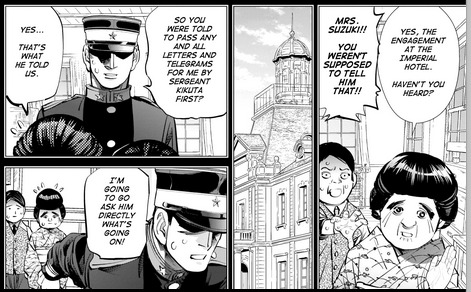
Hanazawa panics and sprints out to determine what is happening. Right on his tail is Tsurumi and his key team of Ogata, Tsukishima and Usami. Clearly this is going to become a huge mess. The next few pages are amusing, but really don’t add value to the plot. I am impressed that Kaeko has an excellent plot to get Sugimoto naked and I commend her efforts! GK is never short of strong female characters. Who enjoy sex.
This sets up a hilarious moment where he’s naked and trapped in a bedroom while she leverages the potential scandal to her advantage. By that point Tsurumi has caught up to them. What is most interesting is when Usami addresses Ogata as Hyakunnosuke and asks him what he thinks about meeting his brother. It is clear this isn’t out of concern from Usami’s part, we know he hates Ogata to his very core.
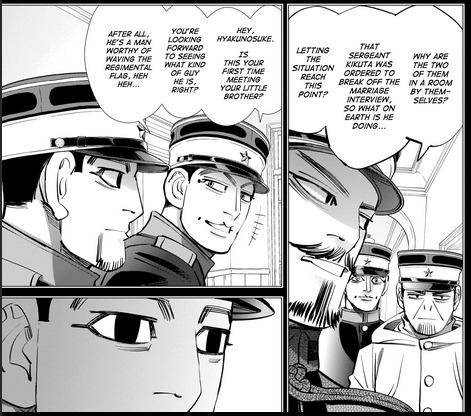
But as usual, Ogata doesn’t respond and we just see only a part of his eyes, not even a glance of his lips to give us an idea of what he’s thinking.
Kaeko and Sugimoto continue to talk as she reveals what she knows from Hanazawa Hiro. She had been a nurse during the first Sino-Japanese war so it has allowed her to reflect on the impact of war on individual soliders.
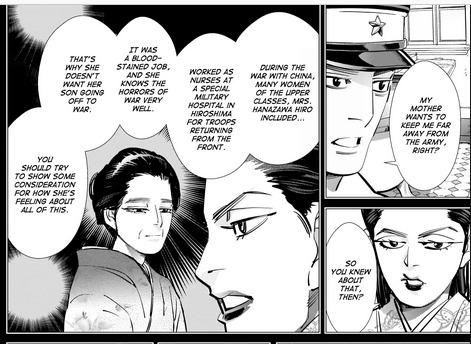
This tells us a few things; Hiro’s patriotism is more nuanced. If she were being selfish and just saying she doesn’t want her son to go off to war without experience it, that would be one thing. Instead, she knows being a military spouse first hand what happens - no one could say she didn’t do her own duty and go likely above and beyond. Ultimately, she wants to protect her son from her own experiences and observations and be a mother.
Sugimoto then realizes he needs to bail and leaves poor Kikuta confused. And then bam! The 27th is there.

Of course this leads to the most Sugimoto situation of all time! Tsurumi threatens Kaeko with his handgun and Ogata asks where Yuusaku is. Of course Sugimoto flies out of the bathroom naked sans Kikuta’s hat and Ogata is just amused beyond belief.
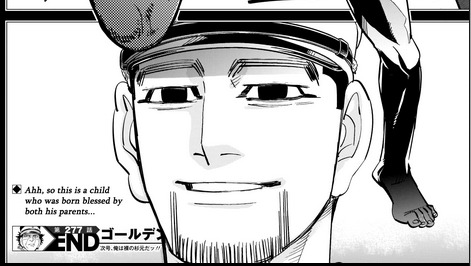
This would be complete if he were relaxed eating a box of popcorn or something like that. 278 continues this absolute chaos and lots of fan service for Miss Kaeko! I really don’t think the fight scene needs much meta. Ogata just finds it amusing (and btw sucks at hand to hand combat) while Usami rumbles with Sugimoto. Tsurumi realizes he’s not Yuusaku and Kikuta rushes in and gets shot in the shoulder by Tsukishima.
Somehow, Kikuta is able to get the rest of them to flee but not without running into the actual Hanazawa Yuusaku. Awkward. Tsurumi only then realizes that Kikuta was doing his job and they run out into the street.
Kaeko tries her best to convince Sugimoto to marry her. Granted he is a very heroic figure and he fought to protect her. However, reality wouldn’t allow that to happen and Sugimoto decides to join the army - thinking he won’t starve that way.

Kikuta looks so sad and disappointed when he hears this.

He’s definitely thinking of his younger brother who died b/c he told him to join the army with him. I loved the fact that we learn that Kaeko got to be a successful woman who was also compassionate to others.
There is a quick exchange that shows the first encounter between Ogata and Yuusaku. Yuusaku notices Ogata and salutes him as a cadet.

Ogata doesn’t even return the salute and he look he gives him out of the corner of his eyes. What is he thinking? I’d say Yuusaku doesn’t know who Ogata even is. But something has him very suspicious to be this leery of him. This also makes me think of this previous encounter between Koito and Ogata in chapter 200.

This time Ogata is bolder when he walks by Koito who is also currently still in the Army Academy. Except unlike Yuusaku who doesn’t seem to pick up on Ogata’s vibes, Koito does! And the two of them stare each other down. I think that this in part shows that Koito has more innate awareness of things and could be considered more of a ‘natural’ in the military. Which Yuusaku isn’t. We have no evidence Yuusaku has any sort of military talent or skills.
The chapter ends with Kikuta asking Sugimoto if he’s serious about joining the military and how he’s already fated to go to hell based on what he’s done in his life. 279 continues the conversation between Kikuta and Sugimoto and he flat out tells Sugimoto about how his brother died of illness in the army during the Sino-Japanese war.
Sugimoto then becomes Kikuta’s younger brother telling him that it is time to move on. This continues the trend in GK where a character that is speaking becomes someone else to the listener.

This is most evident with Asirpa when she becomes Yuusaku on more than one occasion to Ogata.
But this facial expression from Kikuta [sobs].

No wonder Kikuta worked so hard to save Ariko’s life! He can’t just always be responsible for the deaths of others.
Sugimoto convinces Kikuta that he’ll be alright in the army and he relents and lets him keep the cap. This shows that Kikuta has moved on from the death of his brother - a big deal! In an unusual way, Sugimoto has helped Kikuta move on and take the next step in the healing process. Kikuta reports to his commander in the 1st. Okuda wants him to keep an eye on Tsurumi. Obviously, he knows now that Tsurumi interfered with Kikuta’s plans for Hanazawa rather heavy-handedly so he would need someone else to balance it out.
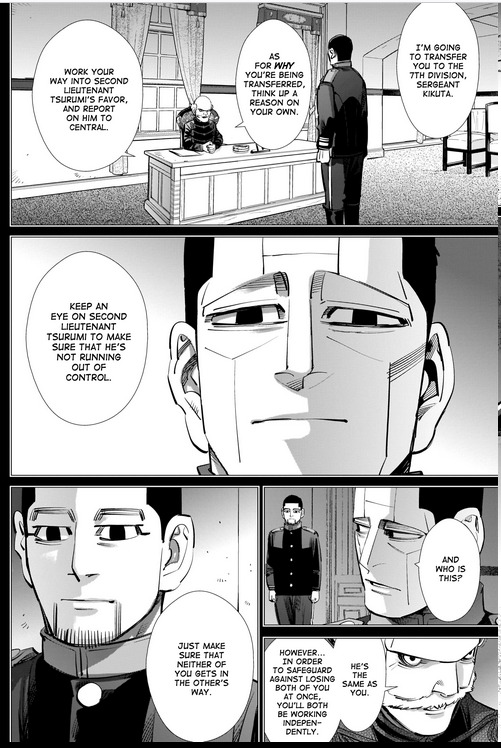
It then reveals that Ogata is also working for Okuda in the 1st. This explains why when the two of them crossed paths in the brewery they did not engage but nor did they appear to exchange any information.
I can’t help but feel like something is still off with this. Ogata does have skills from working in intelligence with Tsurumi. He’s observant, makes himself invisible and can get others to talk easily. But Ogata being a 100% willing spy - it seems like he wants something else out of this. Kikuta’s character screams secret agent - but Ogata, he’s something else. I’m not sure if Ogata’s choice to be a spy on Tsurumi was a real choice.
When Ogata and Tsukishima had their shoot out in Yubari at Edogai’s, Tsukishima told him he was a pet cat for Central. Ogata replied that they were part of a rebel element. We know that Ogata was working with Tamai at the beginning of the manga. I struggle to see how Ogata has loyalty to anyone honestly. He seems to be moving throughout this game with again his own mysterious objective. Ogata is cynical and has no belief in the nation state nor does he harbor any sort of deep patriotism towards Imperial Japan.
Since Okuda is friends with Hanazawa and is based in Tokyo, he may have known Ogata since his birth and has kept tabs on him after the Ogata grandparents took him back to Ibaraki with his mom. Ogata’s existence might be a sort of trump card that Okuda is keeping . . . but others found out as well like Tsurumi. Did Okuda have Ogata tell or leak information that Ogata is Hanazawa’s first son? The chapter jumps to the 203 meter hill in the war and we see Yuusaku fallen on the battlefield. Ogata watches from distance, his face cut off while other members of the 27th run out to help Yuusaku.

This finally reveals Yuusaku’s eyes! Not the anticipated reveal - I kept thinking this was something that Ogata was going to see but it shows us clear eyes. Which look sort of similar to Asirpa’s eyes.
So many thoughts are jumping around in my brain about this reveal.
1.) These eyes are not the ‘trademark’ Hanazawa eyes. Dark black orbs with those eyebrows! This indicates his eyes aren’t from his father.
Seeing this, I can’t help but think that Yuusaku is not Hanazawa’s son. Instead, Hiro had an affair with someone else. A major theme in GK is that the children inherit the skills of their parents. Asirpa is able to do many things as she inherited the intelligence of Wilk. And that Ogata is the true inheritor of Hanazawa’s military skills.
Recall this from chapter 58. Ogata leads the crappy local gang against Hijikata and acts like a commander.
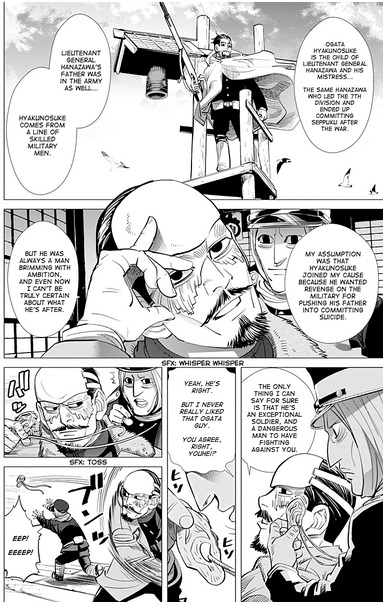
We know that Tsurumi’s lie about Ogata wanting to avenge Hanazawa is to keep Nikaido in the dark.
This would also explain why everything we learn about Yuusaku is terrible at military things. If he also isn’t Hanazawa’s son it would make it even more reason for Hiro to try to prevent him from entering the military since he’s not even genetically related to this great line of Hanazawas. I wish we knew more about the Ogata side of things - I think we’ll also learn that the Ogata side had competent military men on it as well. 2.) Yuusaku’s eyes are the same as Asirpa’s and indicate their sort of innocence. In this case, it would perfectly explain why Ogata sees Yuusaku instead of Asirpa when he has the fever and then the melt down on the ice floe. Yuusaku kept himself naive and innocent to meet his father’s expectations. A man who I don’t think is even his father at this moment. Therefore, Ogata’s guilt on killing Yuusaku is tied to his sort of innocence in these situations and why he can’t seem to shake his mental confusion when it comes to Asirpa. However, unlike Yuusaku, Asirpa has never forced herself on him to do things or guilt tripped him so it leaves things open for him to not link her to Yuusaku.
3.) Yuusaku was going to blow Ogata’s cover working for Okuda. Now that we know that Ogata was working for Okuda while in the 27th it means he’d have to keep his role quiet. If Yuusaku found out that Ogata was working for Okuda, I could see him going to Tsurumi and telling him this information. Therefore, to protect his status, Ogata used this as his rationale to kill Yuusaku on the battle field. I have never figured out if Ogata was nudged to kill Tsurumi by his ‘don’t kill him right now.’ comment as one of Tsurumi’s backwards motivations that lead Ogata to directly killing him. So many possibilities! I want more Ogata backstory dammit!
Anyhoo, to not make this meta super long let’s get back to the action. Asirpa begins working out how to try to break the code. Hijikata notes that Wilk could have used something other than kanji, since he’d know the Latin alphabet for Polish and Cyrillic for Russian. Shiraishi makes a clear point that this could be a message from Wilk towards her, though it feels like he’s channeling Kiro. Out of many of the Japanese characters Shiraishi time and time again comes out much more sympathetic to the minorities than others.
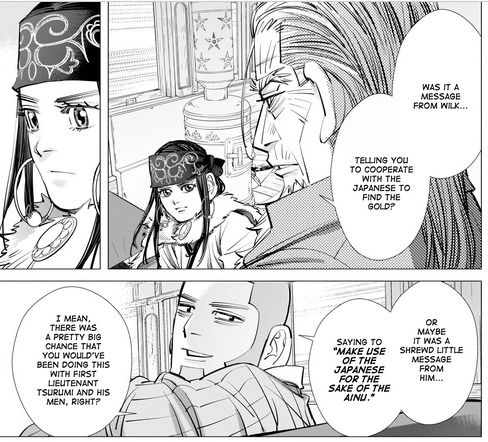
Asirpa begins to wonder how the coin is linked to the skins. She’s thinking things through and is on her way to solving the puzzle.
After saving Ariko, Kikuta is returning to Tsurumi’s group in the church. Oh Roger, this is why I love you so much.
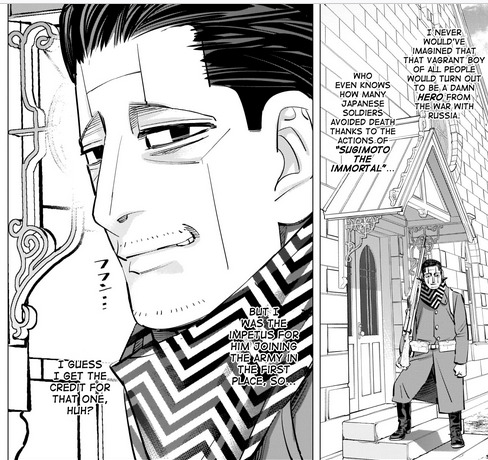
Look at that smirk with a slightly watery eye. At the same time Tsurumi is also looking at the coin and realizes he’s figured it out.
Kikuta approaches the rest of the group and comments on if he’s found the location. Tsurumi states that things are just getting started. He casually pulls out his gun and fires two shots into Kikuta at point blank range.

And with this I am deeply saddened and shocked. How dare you do that to Kikuta!!! He was my Kiro replacement and now he’s also going to die.
First Boutarou died and now Kikuta. [cries]. We know that Tsurumi is a shinigami but this is just brutal. The bear death trio died early on in the manga. Ogata escaped. Kikuta now is the next link to Central that goes down.
#golden kamuy#Golden Kamuy manga#golden kamuy meta#warrant officer kikuta#sugimoto saichi#asirpa#tsurumi tokushirou#Usami Tokishige#Hanazawa Yuusaku#Hanazawa Hiro#hanazawakoujiro#koito otonoshin#okuda#ogata hyakunosuke#tsukishima hajime#wilk#hijikata toshizo#Kaneko Kaeko#okuda hidenobu
38 notes
·
View notes
Text
The New Red Herrings: Biggs and Zack and How Avalanche Tells Us the LTD is Dead
Biggs and Zack are seemingly alive at the end of FFVII Remake Part 1 - so what does that mean? Will they live throughout the story? Maybe they’ll be like Wedge and escape death initially, only to be forced to face it shortly after?
There’s also interesting similarities on the death scenes of Biggs and Zack, A while ago I took screenshots of the “death” scene of Biggs and thought it was interesting how they had Biggs touch Cloud’s head and also made him promise something.
And how are all these things connected to the LTD?
Now, clearly, neither Biggs or Jessie had as dramatic of a death as Zack or Aerith. We actually see the initial injury or incident that causes each of them to die. Cloud comes upon Biggs while he’s already sitting down injured. Cloud and Tifa come to Jessie after she’s under the rubble and try to save her.
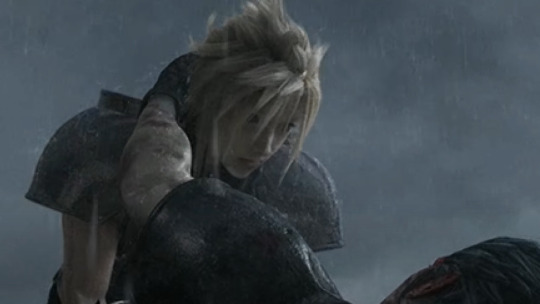
We know Cloud pretty much loses it when Zack dies. He collapses mentally. He’s already been through enough shit to fill a lifetime, and now his only friend, his best friend, and the guy who saved his life, dies trying to get them back to Midgar.
Why Zack is Important to Cloud
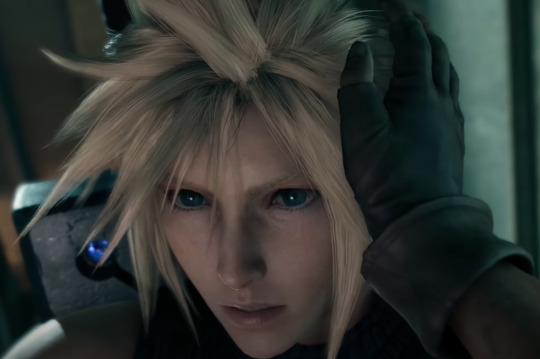
Relationship wise, Cloud obviously had a much deeper connection to Zack. At the point that Biggs dies, he doesn’t know any of that, but I think his death definitely triggers something in him. Biggs saw through Cloud’s front. We know Biggs dealt with the kids at the Leaf House, and most likely acted like a volunteer in the Big Brother program. He tells Cloud he’s got a lot in common with the kids at the Leaf House.
Zack had Cloud take on the responsibility to be his living legacy. Of course we all know he shuts down about five minutes later. Biggs had Cloud promise that this wouldn’t all be for nothing. In both cases, it doesn’t work out. He forgets what Zack told him and the Sector 7 plate still falls.
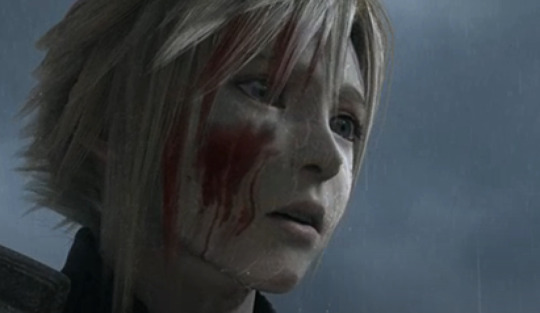
Zack’s death has a major impact on Cloud - it’s ultimately what breaks him. It also gives us these really sad moments of somebody who’s already been through so much and is breaking now.
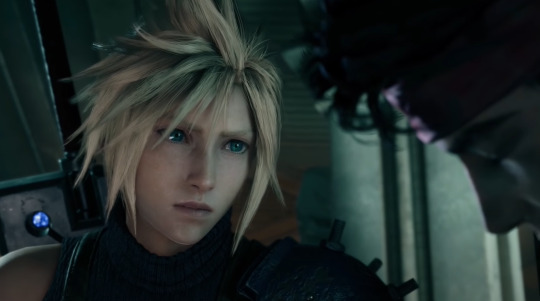
Cloud is upset about Biggs. He was becoming his friend. The three Avalanche members really did accept Cloud and tried to be his friend. He was included with them - in most cases. Of course there’s the Avalanche party that he’s kicked out of (mind you - he does this to himself by acting like an ass to Barret and them) and then during Chapter 4, he’s separated to go steal Jessie’s dad’s ID.
Ultimately, though, we know that Biggs, Wedge, and Jessie all like Cloud. They seem to see through the hard exterior pretty easily. So Cloud loses another person in his life.
The ending of FFVII Remake takes an interesting turn. Anybody who played OG or CC knows what is supposed to happen to Biggs and Zack.
But, Remake’s ending seems to imply that they survive the event that was supposed to take them out.
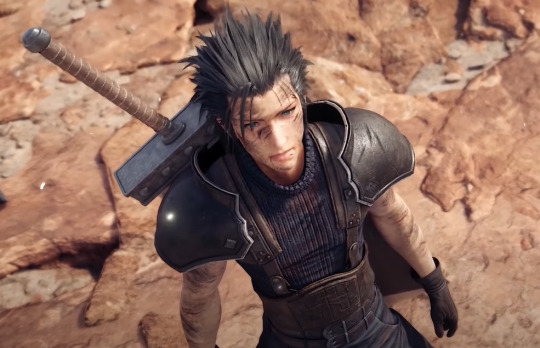
Did Zack survive the last stand? Is this a case of the Last Stand in CC being combined with OG where as they walk away, Zack ends up getting shot anyway?
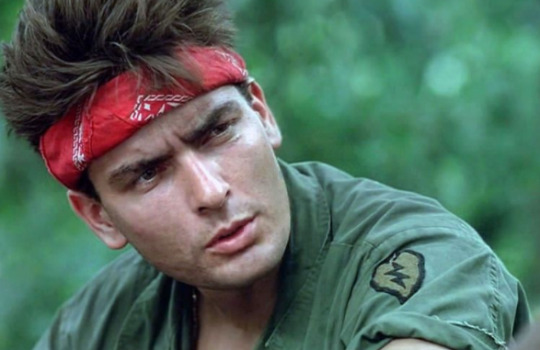
So we also see Biggs.... wait, wrong picture.
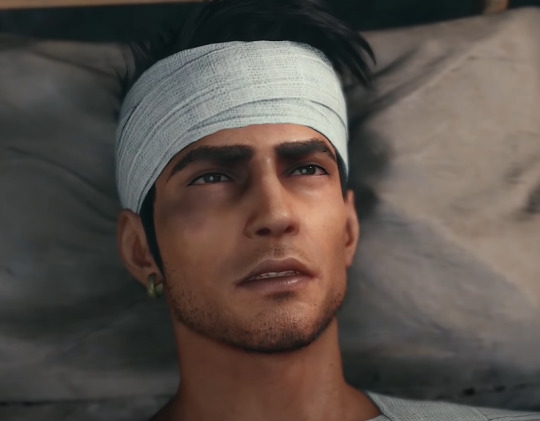
That’s the right one. We get a shot of Charlie Sheen Biggs waking up in a bed in what looks like some type of either infirmary or large room. In OG, we know that all three of the Avalanche members die during the Sector 7 plate fall. In Remake, the only one we get confirmation on is Jessie, and that’s only in the Chapter description.
Wedge we know survives until the Shinra building, where the Whispers ultimately take him out since he defied fate.
So, what will happen to Biggs?
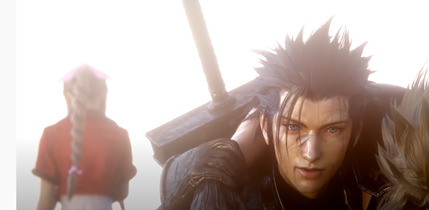
The biggest thing talked about seems to be the ending. Zack surviving created a lot of buzz. Is there a second timeline? Is he going to just simply walk another 10 feet and get shot in the back? Did her survive in the first place? Why does Stamp look different on that bootleg chip bag?
Will we have a beautiful Zerith reunion?
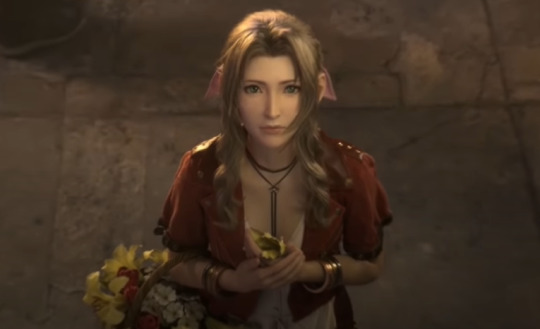
In the OG, the Love Triangle illusion was the red herring. This was mostly to trick and distract the player to focus on something, so later they can destroy you with major twists. It also was used to get the player to like Aerith so her death would be more impactful. In addition, it makes the whole Northern Crater confession from Cloud about Tifa’s opinion being the only one that matters a slam in your face of holy shit what is going on?!
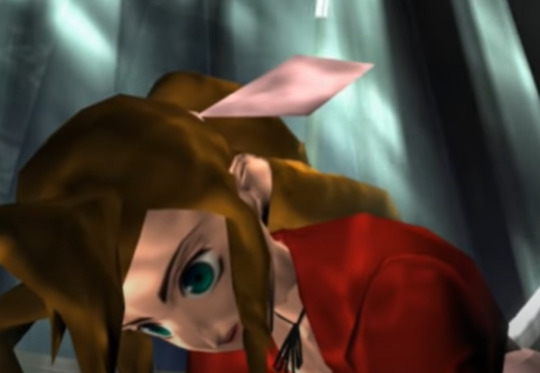
At this point, everybody and their mother knows Aerith dies. It’s not something that was kept a secret. It’s referenced in various materials. The one thing not openly referenced is what’s going on with Cloud. They never reference the Lifestream, the fake persona, or anything outside of the OG and Ultimanias. I think this is a shame since it’s such an important part of his character arc, but I get that they want to try and leave the element of surprise in play.
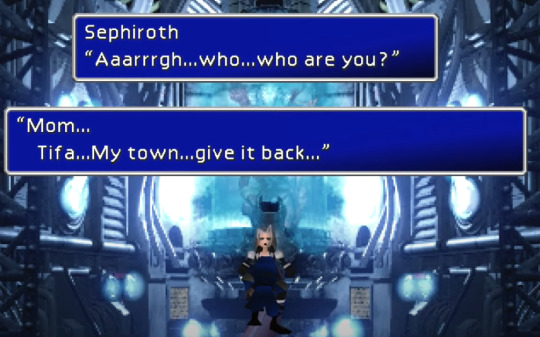
I think everybody would agree that the moment you find out Cloud was just a grunt that was WITH Zack during the Nibelheim incident is super powerful. I still get chills all these years later. Letting this be a well known thing would take away the element of surprise from new fans. Of course, people can go online and read blogs like this one and know all of this, but for somebody - especially future generations - who may just be looking for a new game to play, you’d want this element of surprise to stay in tact.
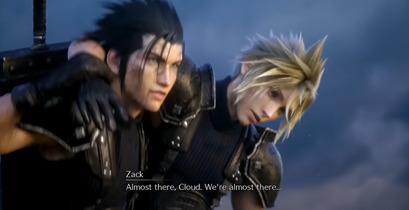
We can’t use Aerith as the only red herring anymore, and we can’t use the love triangle. For many reasons. Everybody knows about it and the love triangle was a poor choice for something like this because some people missed the point completely.
Now, FFVII Twitter is always on fire.
Also, even though the Lifestream and Cloud’s true identity are pretty well kept secrets in terms of printed media, most of the people who played FFVII Remake played the original game, they know what happens. People who were new and played Remake first most likely went and bought OG and played it. So now they know what happens.
They knew this, or they probably wouldn’t have shown Cloud in this state, but even for those who don’t, the alternate timeline theory is born. Biggs enhances this theory because he’s alive too. How can Cloud walk past them AND be carried by Zack in some catatonic state?
It keeps us distracted. They want us to think that fate can be changed. In the case of Zack, they’re even saying that the past can be changed.
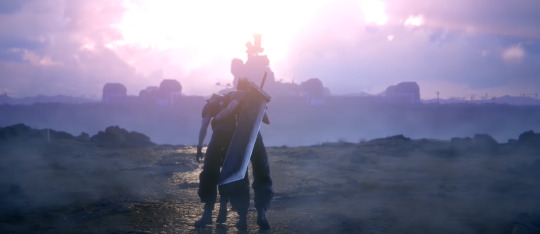
Ultimately, whatever they do, it’ll be shocking to most players. I do trust that the devs aren’t being deceitful when they say they are going to keep the major plot points the same and FFVII will be FFVII going forward. Part 1 keeps major plot points but adds substance to a lot of things. They took out unnecessary parts and enhanced others. They also removed a lot of the love triangle stuff.
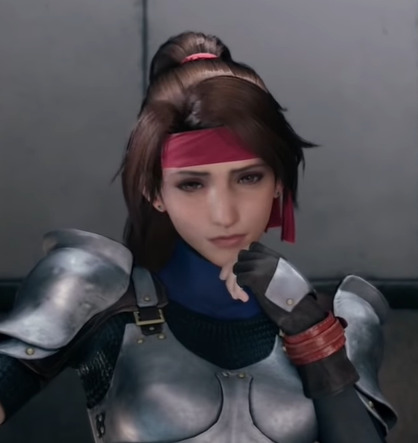
Another striking thing with all of this is the Jessie factor. The Chapter screen tells us she died - it only says Biggs was seriously injured. That hasn’t stopped speculation.
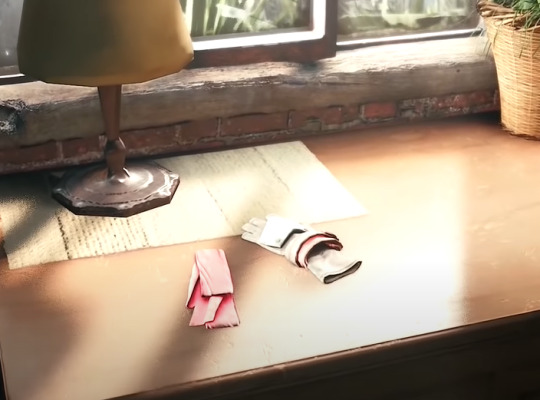
The ending shows gloves on the table next to Biggs’ bed and a lot people said oh it’s Jessie’s left glove! And it does appear that it is. There’s only one glove. To me, this seems like they recovered her body and were able to pull of some personal affects of hers to leave with Biggs. Both articles look damaged or faded.
Faded could mean they’ve been sitting in the sun for a while. The incident happened a few days ago, though we don’t have a definitive time on when we’re shown Biggs. This could be a future look.
They also could simply be damaged and full of dust from the plate collapse.
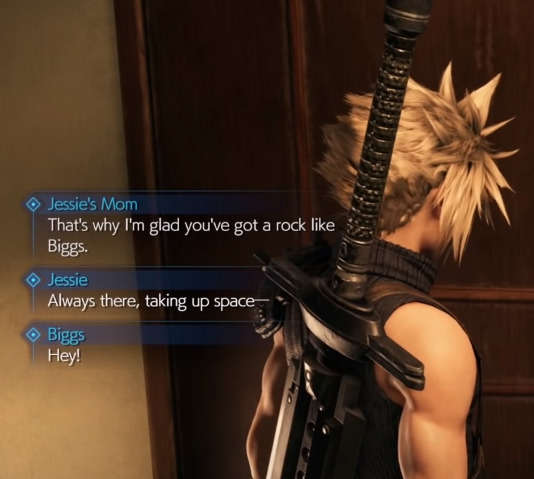
It is implied in Chapter 4 if you listen to the conversation between Jessie’s mom and the gang that Biggs and Jessie have a different relationship than Wedge and Jessie.
I have some thoughts on what this may mean:
Biggs is Jessie’s BFF and her mom likes him.
Jessie and Biggs dated at one point and decided to not tell her mom that they no longer are or that its casual.
Jessie’s mom was hounding Jessie about finding a man so she picked Biggs to be her pretend boyfriend and he agreed.
Biggs and Jessie are secretly dating and only her mom knows.
Which one do I think it is? Well, knowing Jessie, I can definitely see her doing #3. I can absolutely see her acting like Biggs is her boyfriend to get her mom off her back. I think #1 and #2 are also huge possibilities. #4 is far fetched, but they could cover it up by having Jessie flirt relentlessly with Cloud and appear to be single.
Some people think that Jessie will end up at the Gold Saucer singing. Personally, I really hope not. If they keep a bunch of people alive (even if it’s for a short amount of time), it really takes away one of the major themes of FFVII which is death and moving on. In addition, I think it’s too many people they’d need to kill off later. Jessie is a very popular character, so I hope they don’t take that as an incentive to change that aspect of the story.
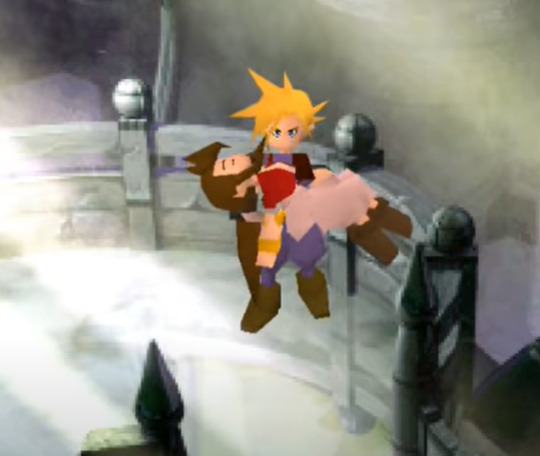
Aerith’s funeral and Jessie’s death are similar as well, so I think it is foreshadowing some things.
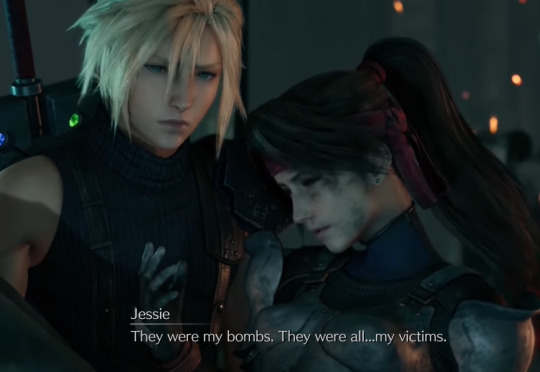
We get a princess style carry here. Aerith and Jessie both get these in Remake. Jessie’s second one ends in her death. Will Aerith get a second princess carry by Cloud? Will it be to take her to her final resting place?
Maybe she won’t even go to the lake - maybe to the sky?
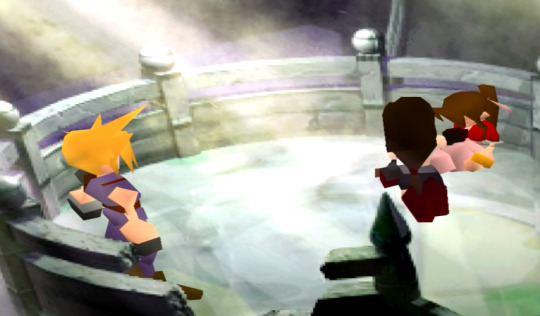
We know Tifa was super upset in OG, and they really don’t touch on it much. We only see her run away crying after this moment. You learn in Case of Tifa that she’s really upset about, but a lot of people don’t read Case of Tifa, so they only know this scene.
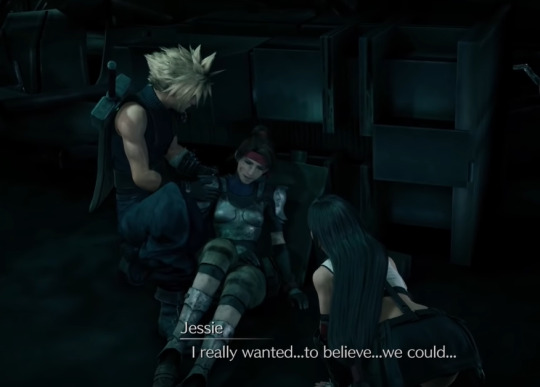
We know that she gets very upset over Jessie’s death.
I think Aerith’s death will be much worse.
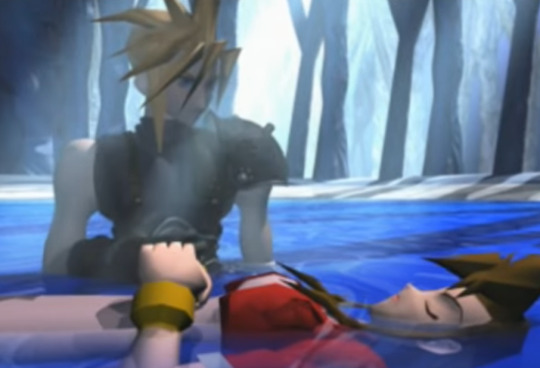
It seems Jessie’s death is a reference to how Aerith’s death was handled in the OG.
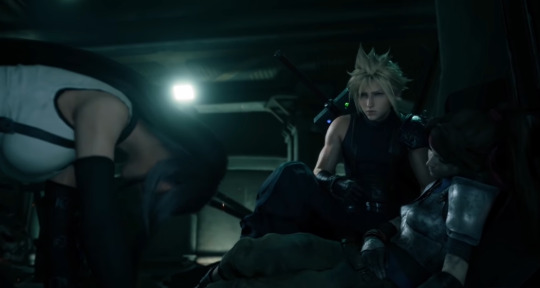
Will it be handled the same? Maybe. I think they’re going to make it seem like she’s going to be okay, and then boom.
So the ending gives us hope that we have two friends that are alive. It makes us think that we can save Aerith. I do think Wedge’s death towards the end and comments that Red XIII made in Chapter 17 may also be hinting towards the fact that you cannot change the past and you cannot change fate.
Over on Discord, @anesuna brought up a good point about Wedge’s cats. Biggums survives the plate collapse along with Wedge. The other two cats - Reggie and Smalls - sadly perish (::cries a lot::). This could also be a reference that Biggs survived while Jessie and Wedge do not.
So what about the LTD?
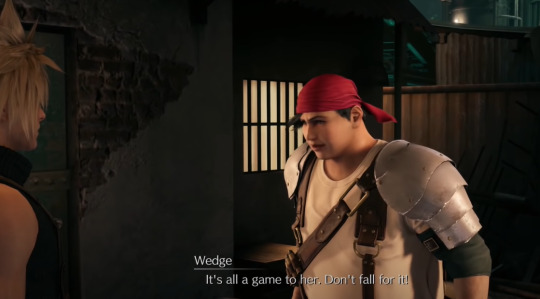
I think this is a heavy reference to the old OG love triangle. Don’t fall for it! They’re warning players now instead of wanting them to fall for it.
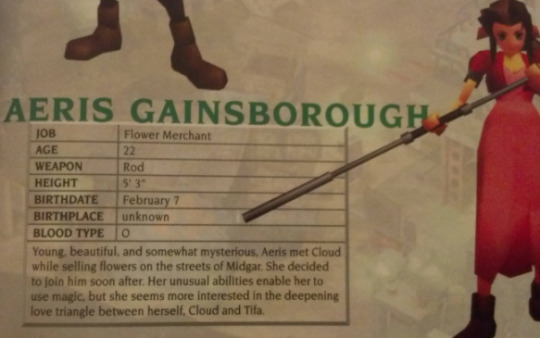
Why do I say this? Aerith seemed to think the love triangle was fun. Thing is, Cloud wasn’t all there at this point, so it was just an illusion. Since players didn’t seem to get that the first time, they’re going to make it clear now. There were a lot of aspects they seemed to take from Aerith and give to Jessie. Overly flirty (with Jessie they added thirsty) and being overly childish at times. Aerith in remake is still somewhat childish, but not completely.
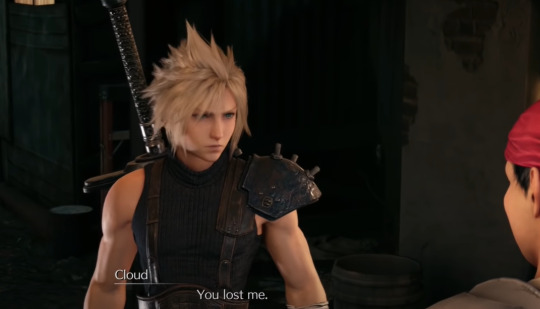
Oblivious Cloud is Oblivious. Yeah, he was oblivious in OG that Aerith and Tifa had feelings for him. He has no idea what Wedge is talking about now. Earlier in this same conversation he thinks that Wedge is telling him not to come around because people will gossip about Jessie being in Avalanche, but the player knows really what he’s referring to...
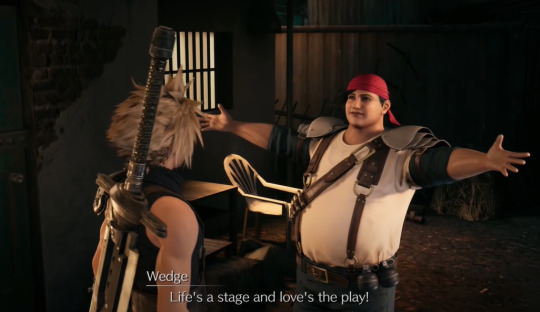
I think this is probably a reference to the Gold Saucer date because of the stage part. I take things at face value and don’t really dig too deep, but I think this exchange with Wedge is supposed to tell the player not to fall for these false loves early in the game.
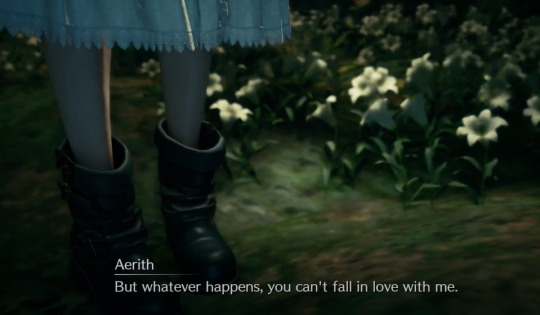
It’s brought up again during Aerith’s resolution scene.
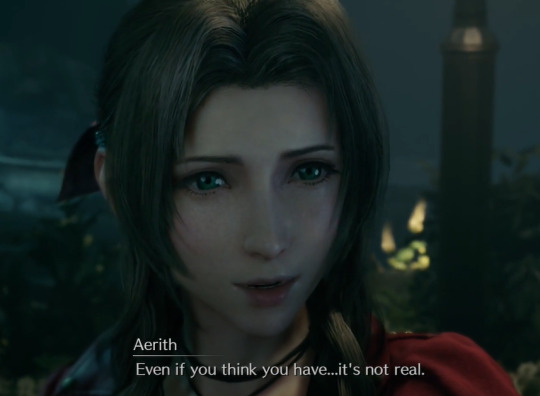
Earlier Wedge said not to fall for Jessie’s trick, because it was a game to her. It wasn’t real love. Aerith is now telling her that if Cloud thinks he falls in love with her, it’s not real.
We have two separate instances in the game where they’re telling you to beware of the false love. It’s two times the word love is used.
After all of this, the ending presents us with two guys who should be dead that appear to be alive. One of them is directly connected to Aerith.
This was their way of trying to shut down the LTD and replace it with different red herrings. Will it work as well as the LTD? Well, it seems that the majority of FFVII Remake fans have talked about the ending.
Yes, a lot of people talk about the LTD, but I think the majority of players are more interested overall in what happens next and what’s up with Zack. I think the majority of the fandom is also ready for the LTD to officially be dead so we can actually focus on everything else and stop the madness.
It’ll never fully stop, but at least it’ll be clear for anybody who plays the game and alleviate the bulk of the chaos.
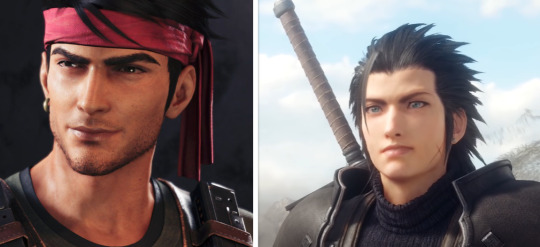
Say hello to your new red herrings: Biggs and Zack.
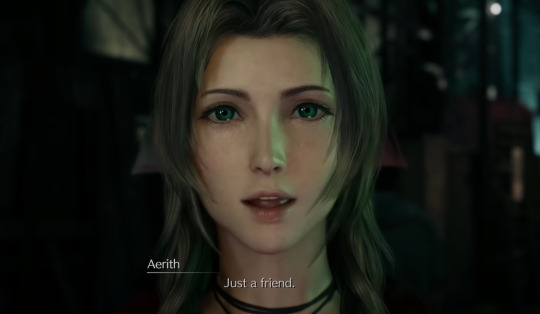
Say bye to the LTD.
#final fantasy 7 remake#final fantasy 7 remake spoilers#ff7r#final fantasy 7#final fantasy 7 spoilers#ff7 shipping war#ff7 theories#ff7r part 2 theories#ff7r theories#zack fair#aerith gainsborough#zerith#cloti#biggs x jessie#biggs and jessie#jessie raspberry#ff7r wedge#ff7 red herring#ff7 ltd#cloud strife#tifa lockhart#this post got out of control#i kept thinking of new stuff
414 notes
·
View notes
Text
Top 5 Worst Episodes of Beyblade
I'm gonna say this right off the bat: ranking Beyblade episodes is weird since they're all so tightly knit together. However, I was able to find five episodes that I find either dull or problematic in some way to make a top 5 worst list. When I make the best list, it’ll likely be top 5 of each season because there are way more good episodes than bad ones. In fact, I don't really think most of this list is bad besides the top two. Anyways, let's get started.
5) Episode 109: Kenta's Determination (Metal Fury)

Yeah... I have really mixed thoughts on this episode. I really love parts of it and I really hate other parts of it. I enjoy it every time I watch it, and I've watched this one A LOT, but if I think about it in a critical way at all, it falls apart. It really does feel like the narrative is gloryfing Kenta for stalking someone. Ryuga told Kenta to go away multiple times and when I first watched this episode, I assumed Ryuga was taking a difficult path specifically to throw Kenta off his trail. We don't know that Kenta's statement about Ryuga taking difficult paths on purpose is true, we're just trusting Kenta's word on that, who is still a total stranger to Ryuga at that point. Kenta and the audience have no actual indication that Ryuga wants Kenta around or is letting him follow him until that moment where Ryuga waits for him in the desert, which you can easily miss if you're not paying attention. I know this because younger me missed it. There isn't as much emphasis on this frankly cute moment as I feel there should be. Still, it does save the rest of this episode and later episodes with these two. Without it, the scene at the end where Ryuga allows Kenta to follow him could easily be interpreted as him giving in because he can't get Kenta to go away. "Remember kids, if you stalk someone for long enough, they'll give in!" You see what I mean? It's obviously not trying to teach that but the way this episode is framed, putting Kenta in the right for this, really makes it feel that way. Still, there is at least that little hint that Ryuga wanted Kenta around before the final scene and honestly I love this episode too much to put it any lower. It bothers me when I think about it critically but dammit I enjoy watching it. I hate that dream sequence where everyone is out of character but putting it aside, I love seeing Ryuga kick ass, I still laugh at that scene where he first meets Kenta and doesn't even know his name, I love seeing Ryuga scare off a tiger just by looking at it, and goddammit, him waiting for Kenta in the desert and that entire scene at the campfire are some of the cutest damn things in this show. I love this episode, even though from a critical perspective, it's a disaster.
4) Episode 68: We Meet Again! Wang Fu Zhong (Metal Masters)

This is ironically the only Masters episode on the list. It's the least of the three seasons for me because the overarching story just isn't as interesting but the individual episodes themselves are fine at what they're trying to do. The only exception for me is this one. I will admit I am not very invested in the Wang Fu Zhong characters. I dislike Chi-Yun and Chao Xin, and before his episode with Julian, Da Xiang as well. Mei Mei is fine though her gag of forgetting words is more often dumb than funny. So seeing them wasn't very exciting for me. I'm also just not invested in this conflict. Gingka, Masamune, Yu, and Tsubasa struggling to work together as a team makes perfect sense given their characters and adds conflict. It makes sense it's just not interesting. There were what... two team battles in the entire tournament? And the way they all worked together in the final act was by fighting their own individual battles so this whole conflict didn't feel like it amounted to much in the end. There was this big emphasis on teamwork with no real pay-off (in this season at least, Fury did a better job with the teamwork angle). It also makes the characters really damn annoying. I mean, I can't stay mad at Tsubasa but the other three were being so bratty, to the point where I was getting just as frustrated as Madoka. There are some good comedic moments in this episode but overall, it's just kind of a slog for me.
3) Episode 37: Rock Scorpio's Deadly Poison (Metal Fusion)

Jeez, another Kenta episode. Kenta is one of my favourite characters. Why are his episodes so hit or miss? This one is kinda like my number four pick: not necessarily bad, just boring and annoying. Busujima is an annoying nuisance and I don't find Sora or his pack of randos interesting. This episode was also really misplaced, coming after Tsubasa leaves the Dark Nebula and before he goes to confront the others. If you skip this episode, you will miss nothing. In fact, this episode takes away from the flow of the story and is just a distraction. Sometimes filler episodes can be okay like the Kenta and Benkei changing parts episode in Fusion or the Blader DJ battle in Masters. The difference is those were fun and the latter especially came at a time when the audience and the characters actually needed a breather. This episode doesn't do that. It takes more than it gives.
2) Episode 130: The God of Venus, Quetzalcoatl (Metal Fury)

Okay, Yu and Tithi's battle is perfectly fine. It's quite fun actually. My problems with this episode occur after that. I've complained about this so many times but I cannot stress it enough: this episode destroyed Kyoya's character. It made me hate him the first time I saw this. Kyoya beat up a child who didn't want to fight. When has Kyoya ever demanded to battle a cowering opponent, much less a child? Tithi being a legendary blader isn't an excuse by the way, he was still a non-combatant. RYUGA was above bullshit like this at this point. Also, Kyoya's reason for deciding to return is horribly stupid and forced. Destiny is a theme throughout Fury but it was always portrayed as a choice the characters made of their own accord, impacting the world around them, not some invisible unstoppable force making them do things. I really respected that about this season. Destiny being a choice is more applicable to real life and just more inspiring and interesting in general. But that's thrown in the trash in this episode when Kyoya feels that destiny is forcing him to be with the group, despite him helping them of his own accord in past episodes and destiny not actually forcing him to do anything. It sounds like an excuse and abandons the actual emotional reason Kyoya left the group in the first place. His internal conflict of feeling weak for being in a group was left unresolved and he comes off as a selfish guy only sticking with the group because he feels he's forced to by some invisible concept, something every other episode in the series disagrees with.
1) Episode 48: The Truth About Light and Darkness (Metal Fusion)

In my opinion, this is the only episode in the series that actively hurts other episodes. The Phoenix twist was already incredibly obvious at this point yet they still feel the need to take up the majority of this episode explaining it and the lore about L-Drago and the dark power in excruciating detail. This episode is nothing more than an exposition dump. In the case of the L-Drago lore, it's actually important, but I ask you: what did the Ryo twist actually add? After this point, it gives us a stupidly incompetent director of the WBBA to make frustrating decisions for the sake of the plot in Masters and to a lesser extent, Fury. However, there was no reason this character needed to be Gingka's dad. Or exist, really. These conflicts could've happened whether or not there was a figurehead for the WBBA orchestrating it. However, this episode even more negatively impacts past episodes by painting Ryo's aggressive actions toward Gingka, especially him breaking his point counter, as abusive. He abandoned him, let him think he was dead, and broke something of his for the sake of shaping him into this "noble hero" and the episode has the fucking gall to not only put him in the right, but have the characters and the narrative glorify his actions. "Remember kids, it's okay if your parents abuse you as long as they're doing it for your own good." This is Kenta's Determination levels of messed up implications. Except while that episode was sweet, funny and didn't hurt any other episodes, this episode is drawn out, boring, and actively makes Fusion as a whole worse. And the worst part is it's unskippable. Like I said earlier, there's a ton of important exposition in this episode as well as Ryuga killing Doji, which is a hugely important scene that shows that not even Ryuga's allies are safe and really hammers in just how greedy for power he is. It's honestly the only good scene in the episode. The L-Drago lore is important and strengthens the final battle but everything else should've been scrapped.
And there’s my list. I tried to make this list somewhat objective, only putting episodes on here that had actual problems and not just episodes that annoyed me. That’s why the Garcias episodes aren’t on here for the record. I actually wanted to put episodes 82 and 83 on here so badly but there’s actually nothing objectively wrong with them. Those characters are annoying but the battles are mostly pretty good, the knockout battle set up is unique, and it’s not a distraction. The world tournament is the main plot after all. Call those episodes dishonourable mentions if you will, I enjoy Kenta’s Determination more than both of them, even though that episode is probably objectively worse.
#beyblade#beyblade metal fight#beyblade metal saga#metal fusion#metal masters#metal fury#I didn't bother including Shogun Steel#because it's only tangentially related#and I don't care about it#ranking list#top 5 worst
8 notes
·
View notes
Text
Book Review - 6 modern female-led Robin Hood adaptations
In the past 8 months or so I have read/watched/listened to over 30 different Robin Hood adaptations. Over the summer I found myself reading almost exclusively adaptations that were written by women and centered women in the story one way or another. (I also found out that “lesbian Robin Hood” is a whole genre on its own.) I decided to write short reviews for 6 of these books since I know I have followers that probably share my enjoyment of this particular niche.
This post includes spoiler-free reviews for the following books
Outlaw and Scarlet by Niamh Murphy
Nottingham: The True Story of Robyn Hood by Anna Burke
Hood by Jenny Elder Moke
Marian, Princess Thief by C.K. Brooke
Heart of Sherwood by Edale Lane
The rest of the post will be under the cut since this is quite long.
Despite the fact that I read other books that could technically fit this same category, I decided to focus on these six in my review because these ones are easily accessible to most of my audience (meaning that they are in English and new enough - the oldest one being from 2018 I think - so that you should be able to find them easily).
I tried to keep these reviews relatively short and spoiler-free. That means that describing specific plot points is impossible because in most of these, the basic premise is the typical Robin Hood origin story. I tried to focus on my general feelings about the books and the characters and their relationships.
I won’t be doing any numerical ratings. I know that the order in which I read these impacted on how I felt about them. If I had read them in a different order, I would probably feel differently about some of them. That’s why it’s difficult for me to give any real ratings. The reviews are not in any real order either, apart from my favorite being the last one.
These reviews are also about 75% serious and 25% not serious. When my friend and I started to go through all these different Robin Hood adaptations, we made a bingo card that features tropes/themes/details found in a lot of different versions of the story. I’ll leave quick comments on the reviews on how each of these did, but I won’t go too much into detail on those.
Niamh Murphy: Outlaw & Scarlet
I grouped these two books together because they are the first two parts of a series. My understanding is that the author does plan on eventually releasing more, but since Scarlet was released this year, it might take a while. If a third book does come out, I might read it, but I’m not in a hurry to reread these two.
Outlaw tells the story of how Robyn, the daughter of a baron, ends up becoming an outlaw. If you are familiar with at least a few Robin Hood adaptations, you will know how it goes. There are no big surprises, but I suppose the purpose of this story is to introduce us to the characters and set the scene for the later books. Scarlet continues Robyn’s story and introduces a new character to the story. (I won’t go too much into details on the second book to avoid spoilers, since its plot does not follow familiar beats as much as the first one.)
Besides the books on this list, I have also read/watched/listened to several other Robin Hood adaptations as well, and when it comes to plot, Outlaw lands in the “uninteresting” section. There was nothing new or exciting there, and seeing that I have spent most of the year in a Robin Hood -bubble, I was left wanting more. Scarlet was a slight improvement seeing as Outlaw was mostly a very generic Robin Hood origin story. Together they still feel like this is just the beginning of a longer story, so I hope that if a third book comes out we get into the real action.
Outlaw is marketed as a “lesbian retelling” of the Robin Hood story, but compared to some of the other titles on this list, I was left wanting more. The romance aspect is barely there, so if you’re going to pick these up for Robyn and Marian’s relationship, prepare for slow burn.
The characters didn’t leave a huge impression on me. I do have to say that the Sheriff’s wife was interesting and I wish we had gotten more of her. Other than her, I felt that at times many of the characters could have been from any adaptation.
Overall, there wasn’t anything really wrong with these books, but they just didn’t entertain me as much as the others. I feel that if I had read these before all the other ones on this list, I would have enjoyed them more. Outlaw and Scarlet are a good read for someone who wants a basic Robin Hood story with a lesbian lead. I still think that marketing the first book as a “lesbian retelling” is setting unrealistic expectations for some, but I hope that in the future the series really earns that title.
I completely forgot to fill out a bingo card for these two and at this point I have forgotten many of the details so unfortunately we’ll never know the result. Most of the tropes hit were so general they probably weren’t on our card anyway.
Anna Burke: Nottingham: The True Story of Robyn Hood
Out of all of the books in this list, Anna Burke’s Nottingham is perhaps the most explicit in its queerness. Although the story obviously doesn’t use modern labels, I would say that it includes representation for (at least) lesbian, bi and trans character(s). None of this feels too out-of-place, and instead Nottingham offers a (mostly) historically accurate Robin Hood tale with a queer main cast.
The plot mostly follows your typical Robin Hood -formula: After a hunting accident, Robyn becomes an outlaw, surrounds herself with loyal friends and helps those in need. This aspect of the book doesn’t offer any new ideas or challenge the existing ideas about Robin Hood as a story. However, it focuses more on the characters, so it doesn’t really need anything new. Marian especially has to come to terms with her feelings towards Robyn and women in general. I do have to say though, that the romance between Robyn and Marian happens a little fast - they only meet a few times before falling in love. [Insert joke about lesbians moving too fast here] It didn’t bother me too much, but I do wish there had been a little more buildup.
From this list, I read this book the most recently. It may be that I was just so burned out from reading all these Robin Hood -stories but I didn’t connect with the book that well. I enjoyed it, but I wish there had been more of that fun sense of adventure I look for in these stories.
I would recommend Nottingham to anyone who wants to read a story that manages to be historically accurate and use the Robin Hood mythos to its advantage while not shying away from its portrayal of queerness. Although it did not hold my attention as well as some of the other books, it is still written well and has a good story.
This book didn’t get a bingo unless you interpret “lähentely* which is uncomfortable for the audience” as the sex scene (there is sex in this book but nothing that explicit, I would say high T/low M in Ao3-ratings) being uncomfortable for the reader OR the third person in that scene being uncomfortable. About half of the bingo card was still filled.
*I couldn’t come up with a good translation for this word, it means something along the lines of making moves/coming onto someone/making advances, though for this bingo I use it to generally mean anything flirty/intimate/sexual/etc.
Jenny Elder Moke: Hood
This book was the first one on this list I read. Compared to the other novels, I would say that Hood is the least like your typical Robin Hood story. The book follows Isabelle, Robin and Marian’s daughter, who has to find her father in order to save her mother. The adventure is brand new, though there are still familiar characters and the basic concept of Robin Hood is honored. This is a story about the next generation of outlaws, so if you’re looking for something that focuses on characters from the legends, you may be disappointed.
Speaking of the characters, I loved Little, Patrick and Helena. I could have just read a book where this group of young outlaws has adventures and been satisfied. Unfortunately I didn’t connect well with the main lead, Isabelle, and the love interest, Adam, felt like a very generic hot guy from a YA novel. The romance itself is practically non-existent, and honestly I could have done without it. Seriously, I had completely forgotten about that whole thing until I started writing this review. This story is more about Isabelle’s relationship with her parents, which I like. She also gets to build genuine friendships with the other characters. I just wish the book had been a little longer so that it could have spent more time developing some of these relationships.
Had I read this book when I was a teenager, I most likely would have loved it a lot more. It is YA, and at times it really shows. As far as Robin Hood stories go, I generally enjoy the “outlaws being outlaws in the forest” content the most, and unfortunately this featured surprisingly little of it. It still offered its own take on what could happen after the legends everyone knows, even if it doesn’t add much to the legends themselves.
It is important that I mention here that if Allan has a child in an adaptation, this child must be named either Allan jr. or Alana. This book fulfills this basic need for me and I am satisfied. It also checked most of the boxes on the bingo, and I almost filled the whole sheet. So somehow, despite not really following the typical Robin Hood formula, Hood managed to include all the important tropes.
If you are a teenager who enjoys Robin Hood -stories, I would definitely recommend this book. It’s not the best YA novel out there, but it’s a good standalone story. I think that for adults, this can be a good read if you are a fan of Robin Hood -stories and/or enjoy this type of YA anyway. I wasn’t sure what type of book this was when I started reading, but if you just prepare yourself for a fun adventure aimed at young teens, you can enjoy this. It’s very quick to read, I think I read it in one day.
Also, I must quote a review I saw on Storygraph (imagine this is in all caps) : “hjsxhfjsdksfjk???????????? Patrick best character no cap”
C. K. Brooke: Marian, Princess Thief
In Marian, Princess Thief, Robin Hood doesn’t exist at all. Instead the story follows Marian, who in this version is a princess, who escaped an assassination attempt and is now living in the forest as an outlaw with six other women - the genderbent versions of the Merry Men. Eventually there is a romance in this book as well, but the biggest force carrying through the book is the friendship between the women. If I had to describe the novel in just one word, I would say it’s lovable. If I had to describe it in two, I would say it’s dissappointingly heterosexual.
Maybe the fact that I found a genre that is basically “lesbian Robin Hood” has ruined me, but how can you write a story that features seven women living in the forest as outlaws, and not one of them is queer? This is entirely a thing that bothers me personally, and the book doesn’t need queer representation to be good, but there is no reason to not include it. Headcanons can fortunately go a long way, but I’m just saying that you could easily keep everything about Scarlett’s backstory the same except make her a lesbian. (In fact, I’m 98% joking when I say that her not being a lesbian is a homophobic choice. I will elaborate on this if you ask me but I won’t go too much into it here because I would have to explain things about other adaptations as well.)
As for the straight romance, I can’t say that I was feeling it. I could see the points where I was supposed to feel something, so maybe it’s just the fact that I’m aspec myself, but I didn’t care that much about it. Still, it was refreshing to see a story where the romance doesn’t overshadow the friendships between the women, and instead they are valued just as much (if not more) as the romantic relationship. The story doesn’t dig too deeply into the characters, but I still loved all the women. (I don’t care about the male lead. But I know others who would.)
I think the biggest “problem” this book has (apart from not making Scarlett a lesbian) is that the ending feels just a little bit rushed compared to the rest of the novel. I still think that the novel achieves everything it tries to do, but I could have used one more chapter to flesh out the climax.
The bingo card wasn’t even close to being full, but you know what, Marian, Princess Thief is good enough as it is and doesn’t need to follow all the familiar tropes. Still, how hard is it to include a bird?
This was a very quick read, in fact I basically just read it all in one go. I would definitely recommend it to anyone who wants to read something lighthearted and, like me, is often disappointed by the lack of women in Robin Hood stories.
To end this, I will leave you with a translated quote from my WhatsApp commentary: “What is it that in all these Robin Hood stories these old dudes are all after these young maidens like get yourself a hot milf and leave the kids alone”
Edale Lane: Heart of Sherwood
Heart of Sherwood is my favorite Robin Hood -novel that I have read so far. It has just about everything I could want: good characters, a fun sense of adventure, political scheming, great relationships (both romantic and platonic) and a good ending. I was less than two chapters into this book when I knew that this would be a difficult one to top.
The premise of this book is very similar to Burke’s Nottingham: both follow the story of Robyn becoming an outlaw, making friends with the other Merry (Wo)Men and developing a relationship with Marian. I don’t want to compare these two stories too much, but I did prefer the more lighthearted tone of Heart of Sherwood. This was also the first book where I was actually invested in the romance. Normally in pretty much all Robin Hood adaptations, the relationship between Robin and Marian doesn’t interest me greatly; I don’t mind it, but it’s not something I have too many personal feelings about. However, only a few chapters into Heart of Sherwood I thought: “If these two don’t get a happy ending I’m going to jump out of the window.” (I won’t spoil where this threat ended up going.)
One thing I appreciate about the romance in this one is that Robyn and Marian already know each other, so I didn’t have to deal with a romance that develops too fast. The novel also had other things to offer besides being a “lesbian Robin Hood” story, so I didn’t feel like I had to enjoy the romance to enjoy the whole story. I was very invested the whole way through, and out of all the books I’ve reviewed here, this one made me the most emotional.
As a fan of the BBC show, I do have to say that this novel had a very similar vibe; there was a good balance of action and humor. Maybe that was a part of why I enjoyed this so much. I was also able to predict exactly how certain things would end up. I kind of wish I would have been more surprised.
This novel is well paced, it is exactly the right length for the story it’s telling and overall I can’t really find things to complain about. If I wasn’t petty, I would give this book full five stars, but because I am petty, for very personal reasons I’m giving it 4,99999… stars. As for the bingo, this one filled most of the sheet.
I’ll end this review with this random line I had shared on WhatsApp for some reason: ""Does this mean I am dead?" Alan asked in jest. - - - "Nay; same annoying jester, alive as ever, and likely wanting for a pint about now."”
Conclusion
Writing these reviews was surprisingly difficult because most of the stories follow the same formula, so commenting on anything that moves away from said formula could be considered a spoiler. Hopefully if you read this far you were still interested enough in at least one of these books and feel inspired to read them. I would happily recommend any of them, and if you want to know my more detailed thoughts on them, feel free to message me. The same applies to all the adaptations I’ve gone through. I have Thoughts that I’m dying to share.
#robin hood#my post#I have no idea how to tag this???#my own tag for the bbc robin hood is pretty much my general rh tag but I don't want to put this in the public tag since this technically has#nothing to do with it
3 notes
·
View notes
Text
Why Lebanon was a great episode
(yes, even if you’re someone who hates John)
I’ve decided to make this (controversial?) post about why Lebanon is good (please don’t kill me) and moreover why it’s a really important episode for Dean, because I’ve seen a lot of hate towards the episode that I don’t particularly agree with. I’m just gonna make a list to keep things simple:
- Yeah, the pearl brought Dean his father. That’s not very surprising, and honestly it makes sense. Why? Because Mary was alive. Let me explain: if Dean got the pearl a few years earlier, it probably would’ve brought him Mary. Or maybe Bobby. Not John. But with Mary alive, what does Dean want? The same thing he always has. Family. It’s not about John, it’s about him having his whole family in one place together, for once.
- Dean got to have that fantasy. He got that family dinner and honestly? I’m happy for him.
- It was sweet because Mary got to see John again. It was a nice thing to include in her plot line. (A lot of this episode existed for her.) They had a chance to reunite and say their goodbyes.
- Even though Sam thinks he had a worse relationship with John than Dean did, that’s not true. But I think he still has that idea in his head. So, it was nice for him to get an apology from John. And then Sam gets to straight up admit “you did some messed up things.” Of course, he says that’s not what he thinks of when he remembers John. Rather that what’s important to him is having a chance to say goodbye. This makes sense for Sam, who since season 2 has proved to actually be more apologetic about his father than Dean, despite what one might first assume. (He likes having a good memory of him, whereas Dean has used John’s death as an opportunity for freedom. Freedom to admit—at least to himself—what he thought. He’s done a lot of healing.) There’s something nice about Sam having that goodbye, seeing as Sam went through a lot of trauma finding John dead in the hospital after they fought. Sam had a lot of guilt, so even if that wasn’t in the forefront of his mind anymore, it was nice for him to delete one little piece of guilt from his past. Because Sam takes on a lot of guilt that he doesn’t need to.
- To cover another side of things: do I personally hate John? I mean I don’t particularly like him, but I also don’t want to throw him off a cliff. So whatever that means to you. I think a lot of people who despise him say this episode was terrible out of hand, maybe because they didn’t like that John was met with forgiveness. On that note, I want to add to this list that the forgiveness aspect of the episode just goes to reinforce the fact that Sam and Dean are, in their hearts, some of the kindest people on the planet. You don’t forgive because someone deserves it, you forgive because you decide to give them that. Because you’re the bigger person. Was it necessary? Did they need to forgive him? No, of course not. But it’s the path the brothers chose. Why? Well, probably because he’s their dad and despite any water under the bridge or opinions they may have of him... at the end of the day, whether everyone likes that fact or not, they still love and care about him. It’s a complex relationship, to say the least, with a lot of past turmoil. But yeah, they still love him. (And they’re heroes—so yes, of course they chose forgiveness.) Considering the fact that they still loved him, it was also kind of nice for them to reunite for a family dinner, especially when paired with us seeing such a drastic difference in how they now think of and relate to him. Speaking of which...
- DEAN GOT TO MOVE ON AND REALIZE THAT HE AND HIS LIFE ARE WORTHY. And what makes that even more moving? The fact that it had NOTHING TO DO WITH JOHN’S APPROVAL. I get so happily emotional over this. Dean tells John what his life looks like—how they live with Jack and Cas. Later he sees Cas, but Cas doesn’t remember him. He tries to get through to Cas, but it doesn’t work. He’s lost his found family and it HURTS. When John tells Dean “I’m incredibly proud of you,” the look on Dean’s face??? It wasn’t a face that said “this means so much to me.” (It wasn’t even a face they kept the camera on for very long, in order to convey a sense of the line making a huge impact.) It was a face that said “hmm alright.”
And then John tells Dean that he wishes he’d gotten a family. And what does Dean say? “I have a family.” There’s an air of truth and pride when those words come out. He HAS A FAMILY. A NEW family. A found family. One that he would be heartbroken to lose, or to trade off.
Through the whole episode there’s such a vibe, but it’s strongest in that scene. When it comes to Dean, we see something spectacular. Sometime during the last few years, he’s become settled in himself. He realizes “wow, I don’t actually care what my dad thinks of me, at all. Because I know I’m doing good. And I love the life that I have. And I’m proud of it myself and that’s enough.” He talks to John not like his son, but as another person, if that makes sense. He doesn’t need validation, and hasn’t needed it for a long time. When John showed up, the way it was treated by the story, and even the way Dean treated it... John was no longer this important person in the hierarchy with either of the brothers. He was a guest in their home. And Dean showed John his life proudly. That was freakin beautiful to see.
#supernatural#lebanon#dean winchester#john winchester#meta#sam winchester#mary winchester#spn#i've been considering writing this for a while#but I've only just worked up the courage#pls don't attack me this is just my opinion lol#mine
9 notes
·
View notes
Text
ABOUT THAT WRONG THING
Here’s the analysis I promised. *** CROOKED KINGDOM SPOILERS *** WHY WAS MATTHIAS HELVAR’S DEATH JUST WRONG? 1. THE WAY IT HAPPENED 1.1. The Hand of the Author “The Hand of the Author” is an expression that indicates how much we feel the presence of the author into the story, the moments in which they intervene to manipulate the events in a forced and unrealistic way instead of following the coherency of their own plots. Now, let’s think about the sequence of the scene: a) Matthias if left alone and unarmed at job done; b) the boy has been able to follow him despite the messy situation; c) Matthias decides not to defend himself and talks to him in a kind and totally reasonable manner; d) the boy shoots him anyway. This death is absolutely anti-climatic, forced and disrespectful for such a character and the scenes from chapter 38 to 40 seem to be completely disconnected from the rest of the story. It looks like the author (despite her statements) was going to finish the book and said : “Oh, no, I cannot end this story without killing at least one main character, let’s kill the one I think the readers like less!” Even though Matthias was the worst character to kill off, as I’m going to explain in Chapter 2, if the author desperately wanted to kill him, she could at least give him a more decent death, like, for example, making him sacrifice to save someone. 1.2. Confusing sequences Matthias is shot by the young drüskelle, but he is still able to run to Nina. What does this mean? Why does the boy let him go, after shooting him? I honestly doubt Matthias has killed him to escape. Maybe he has knocked him down, but that wouldn’t make more sense to the entire context. 1.3. Fjerdan mentality Matthias gives the young drüskelle valid reasons to put his gun down: he has no weapons and cannot go anywhere. Do Fjerdans, filled with hatred but also obsessed with honour and discipline, really teach their young soldiers to be blinded by anger and kill a wanted man (“Dead OR ALIVE”) who is unarmed and willing to cooperate? The boy could have become a Fjerdan hero, if he had brought Matthias as a prisoner to his companions, rather than shooting him for no reasons and then being also unable to prove he killed him. 1.4. Double standards An author cannot build an unrealistic plot armor to some characters (for example, Kaz, a limping boy, who defeats all the Dregs alone) and kill others in a totally “random” and anti-climatic way, at job done. As I say in my small guide “Five simple rules every author should know about characters’ deaths”, double standards compromise the logic and the coherency of the story. 2. THE WAY IT BREAKS BASIC NARRATIVE RULES 2. 1. Character development Matthias’ storyline is mainly focused on two topics: his relationship with Nina and his character development. He literally spends two books to work on himself, unlearning everything he was taught since he was a child and finding a new purpose based on his change of heart. When characters are made to evolve during the story, the most logical choice is to give them an opportunity to make their development useful and significant outside of their safe zone (for example, their group of friends). And, most important thing, an author should never kill their characters if they haven’t complete their development. And that’s why Matthias was the worst character to kill off at the end of Crooked Kingdom: first of all, he hadn’t fully complete his development (he was still very insecure during social interactions and was still fighting against crumbles of Fjerdan mentality); secondly, no one out of the Crows has seen his development, since the author made him fail during his first real attempt to demonstrate something. I think people would need practical demonstrations to make a change possible, it can’t really be enough for them to hear his story from Nina. It’s just not realistic. Killing Matthias in that way and in that moment, made the character uncompleted and his entire development vain. I’ll conclude the subchapter with a simple example: why do you think it was Jack to die in Titanic, instead of Rose? Because Jack was a complete character, while Rose was still completing her development and had to put it into practice. The criterion is the same. 2.2. Characters’ deaths and their impact on the story Authors owe respect to their characters and have to build their paths properly from the beginning to the end, to guarantee quality to the story. Unless they’re writing a story about random events of human life, they should kill characters only when their deaths make sense to the plot and can give a valuable contribute to other characters’ storylines. A story lacks of quality when characters (especially main characters) are killed just for shock value, to add unnecessary angst and suffering to other characters or because “I cannot give a happy ending to everyone, happy endings are for children”. Matthias’ death was anti-climatic, useless and has so little impact that, if a reader jumps chapters from 38 to 41, it almost seems nothing has changed. 2.3. The failure After everything Matthias did to change and evolve, the author made his first attempt to put in practice what he learnt a huge, undeserving failure. First of all, even though he is unarmed, Matthias is fully able to defeat the boy but he doesn’t do that, that means he chooses not to defend himself. He wants to give the boy a possibility, he wants to demonstrate that there’s still hope for Fjerda. And his faith is repaid with death. These kind of plot choices SOMETIMES (and not in this case) can make sense if written at the beginning or in the middle of a story, not at the ending, when everything seems to be resolved. What is the author trying to suggest us? Fjerdan people are hopeless? If Matthias hasn’t been able to persuade a young boy, who, despite his anger and hatred, should have a more “elastic” mind, how could it be possible to convince older people in Fjerda, who have lived with their beliefs for decades? Does the author really think it is realistic that Nina’s words will be heard by Fjerdans? I’m starting to think her and Matthias’ dream is just destined to fail… * SPOILER FROM NIKOLAI DUOLOGY * (Please, don’t mention me the Nikolai Duology, which I tried to read but I abandoned due to several reasons, one of them, I consider the Crows’ arc closed, after that ending, and I don't like the idea of using the group only as a "passage moment" for both a character and a major plot. And to be honest, I think it’s just not fair that the work Matthias started to change Fjerdans’ mentality would be finished by a character who is just similar to him (well, even too much similar) but hasn’t faced everything he went through with Nina. It sounds like Bardugo is trying to replace him and this is bad. 3. THE AUTHOR’S STATEMENTS And now, in the third and final part of my work, I’m going to report some statements the author said during interviews about this choice and explain why I cannot help but strongly disagree with her. 1. “Matthias didn’t deserve a happy ending because he spread too much hate, he had to pay.” Okay, first of all, Matthias didn’t just wake up one morning, deciding to spread hate for no reasons. Do we need to think about his background? 1. He had always been taught to fear Grishas and see them as monsters; 2. A group of those monsters killed his family and he has been taken by a man who took advantage of his trauma to turn him into a weapon. He received bad teachings (and not only from Jarl Brum, but also from Grisha people who burnt his family alive), he has also been able to unlearn those teaching and decide to do something to repair and make things better. About the “he had to pay” stuff, excuse me, but he has been tortured in Hellgate for a year, being forced to kill wolves, that were not only sacred to him, but also reminded him of his own pet wolf, and living with the belief that the girl he fell in love with had betrayed him. Wasn’t that enough? And, last but not less important, here we go again with double standards: Matthias, who understood his mistakes and was determined to fix them “didn’t deserve a happy ending,” but Kaz Brekker did? Kaz is a great character, but he also did terrible things and I’m sure he’ll never do anything to fix them because he’s too broken and rotten inside. That’s okay, not all the characters are made to have a great development, but statements like this, when we compare the two characters, just sound a bit incoherent. 2. “He has been killed by the younger version of himself” Does the author really think this is a great symbolism? Doesn’t she know that being killed by a younger version of yourself, especially after you went through a great redemption arc, just means “Regression”? She’s basically saying that it doesn’t matter if you worked hard to change and to fix your mistakes, you don’t deserve to be forgiven, you are your past and you’re destined to be destroyed by it (unless your name is Kaz Brekker). Past is a part of us, of course, we cannot change it and we can be hurt by it, but we cannot let it “kill” us. The message the author gave is just wrong and filled with extremist, unnecessary moralism. It definitely doesn’t fit the atmosphere of a Young Adult novel, which should promote progression, instead of regression. As I said, she also seems to be willing to demonstrate that Fjerdans are just evil and will never change. I wonder if Bardugo has ever seen “The Lion King”, because Rafiki would be very disappointed by all of this. 3. “I knew from the beginning I would have killed him off” Even though the way she killed him seems to demonstrate something different, Bardugo has always stated that she wanted to kill Matthias by the moment she created him. Okay, we can believe it, but I can still speak against this statement. How? I’m sure this thing has happened to many writers: we create characters and decidespecific endings for their storylines, but, while we’re writing, those characters “come to life” into our hands and they sometimes evolve out of our control and start to lead us to a different path. Since the story is made by our characters, we should follow the directions they take, for the sake of the plot: we shouldn’t listen to fanservice or to old plans, we should listen to our characters. That’s why it can happen we end up saving a character we were meant to kill of at the beginning, as well as killing a character we hadn’t plan to kill off. It is just wrong to stubbornly follow an old idea that doesn’t fit the story anymore, that’s why authors cannot use it as an excuse to justify their mistakes. (The finale of “How I Met Your Mother” is a great example to explain this concept). 4. CONCLUSIONS “Geez, what was that for?” - It doesn’t matter. It’s in the past. “Yeah, but it still hurts!” - Ah, yes, the past can hurt. But the way I see it, you can either run from it, or… learn from it. (“The Lion King”, 1994) Matthias wasn’t even running away from his past. He faced it. He wanted to do something about it. He was ready to rise from the ashes of his past and work for a better future. And those are all the reasons his death is just wrong from every kind of perspective: narrative, logic, symbolism. Matthias Helvar deserved better. Not only from his life, but also, and especially, from the author who created him. *** Hope you agree with me. Haters stay away, I won’t change my mind. Don’t make flame under my post. If you agree with me and like my work, feel free to share. Thanks for reading!
#six of crows#crooked kingdom#six of crows duology#grishaverse#SPOILERS#Matthias Helvar#Nina Zenik#Kaz Brekker#Inej Ghafa#Jasper Fahey#Wylan Van Eck#analysis#major character death#no sjw#no haters#young adult books#ya books#I worked hard on this#I won't change my mind#he didn't deserve this#that was just wrong#a very big mistake
134 notes
·
View notes
Note
Hi! sorry they're from the bottom up. 55 48 42 38 37 21 17 2
Okaaay, so this has taken me a bit to get around to, sorry!
55 How do you manage your time/make time for writing? (do you set aside time to write every day or do you only write when you have a lot of free time?)
I'm currently on sick leave, so I do have a lot of free time, in the sense that I'm not working. It's more a matter of trying to work up the energy and focus to be able to write. I try to sit down with my story document every day (night, let’s be honest), doing some editing and trying to get into the groove to write more. Some days I manage, some days I don't. Sadly I have very little control over when my brain decides to work, and when it doesn't.
48. Do you prefer to write skimpy drafts and flesh them out later, or write too much and cut it back?
I can't really do drafts – the only drafty thing I do is make a simple keyword outline for what should go in a particular chapter, and then I go straight to writing. I write everything as completely as I'm able, in chronological order, to create something very complete on the first run.
I just can't go back and add/remove/move any big things around later, it completely messes up the rhythm and feel I've crafted! It can even be a problem, sometimes, when I realized I forgot to put something in there - and some 75% of the time I'll opt to leave it out for later rather than trying to shoehorn it into an already completed text. XD
(This is why I do fanfiction, not attempting actual literature. Then people would tell me what to do, and I would get upset and run feral into the woods and never return.)
42. How many drafts do you usually write before you feel satisfied?
Same as above – first ”draft” = completed text, pretty much. I'll edit certain words and move words around a bit, but on the whole, I just sit down and write the text that will be the finished story.
38. How do you nail voice in your books?
Oooh, that's an interesting one! And possibly one with a rather long and complicated answer...
I'm neurodivergent and grew up with one pseudo-abusive aggressive parent, and one reason I've been able to pass as ”normal” so well for my entire life that I was only just diagnosed this year, is that I'm extremely good at studying and analyzing people. Their body language, tone, expressions, word choices etc... I hadn't realized not everyone did this! Most people apparently just spontaneously... do/say things? Without analyzing them beforehand, and consciously shaping the impression they want to make and what reactions to instill? Wild!
Anyway, I take that habit of analysis into my study of fictional characters as well, and when I have a special interest, I get super immersive. I literally go into the character's head, feel their body language settle around me, lean my own conscious self back and hand the reins over to the persona my analysis has constructed to see what they'll do.
It includes things like voice (word choices, tone), body language/expression, way of thinking, way of relating to others, reactions in any given situation...
For my own stories, I often have multiple viewpoint characters to get immersed in. For existing (fandom) characters, it's harder – I really have to vibe with a character on some level to be able to do the full immersion.
So for Roadtrip, I spend about 70% of the time constructing the story from Xue Yang's POV, since he's my main viewpoint character. Xiao Xingchen and Song Lan are harder to completely get into; I'm not all the way in their heads and hearts, just... very close? I can still read them, know what would make sense for them to see and say and feel, I just don't feel it quite as strongly. (Xue Yang feels things very strongly. Very strongly. I have cried. Multiple times.)
So yep, uh. Short answer; ”be crazy, vividly pretend you're other people”. Kind of. :D
37. Do you ever write long handed or do you prefer to type everything?
Type! Dear gods, trying to write by hand drives me crazy – I need to be able to polish things as I go along, so writing by hand means tons of tiny notes in margins and lots of frustration. So no. Typing all the way.
21. What aspect of your writing are you most proud of?
That I'm doing it at all.
I think I've mentioned this one before, but it's true! My brain has taken a lot of bad beatings, being pushed far beyond capacity by all those years trying to perform to not only neurotypical but gifted standards, and inevitably failing again, and again, and again... Successive burnouts can lead to permanent brain damage, and these days I struggle a lot with focus and memory issues.
A lot of things I used to take for granted in plotting stories I just can't do anymore, my brain won't let me – if I don't write things down and outline them, I forget. Being able to focus at will – nu-uh. Trying to force it, writing in a non-native language when having a bad brain day? Not happening. It's always a struggle – most days I manage to overcome it, especially if I've been encouraged by comments and questions that get my brain kickstarted! But some days I just can't.
I'm trying to look at what I've achieved so far and feel proud, and try not to think too hard about what I used to be able to do. I'm doing well, all things considered!
And of course I'm also very proud of the impact my writing has on others, especially when people comment and tell me I made them cry, or feel some other strong emotion..! That's amazing, the best feeling in the world. ♥♥♥
17. What things (scenes/topics/character types) are you most comfortable writing?
Oh... I think I'm honestly pretty versatile? I don't have a huge preference for what kind of scenes I'm more comfortable with as such, I can do dialogue or action or sex or whatever... It's more about the feel of it? Something with oomph, emotional impact. I do like to write people talking, especially if it's about difficult subjects and lots of emotions involved! Angst, grief, anger, fear... Strong emotions. That's delicious stuff. ♥ (Writing Xue Yang just being a sassy asshole is fun, too, though!)
I prefer writing adult/mature people over teenagers and children (though honestly, with Xue Yang, there's a lot of childishness to him, despite him by now being the technically oldest of the three – when it comes to maturity, he has, uh, range.) I like characters with some emotional insight into others (which Xue Yang has not, Song Lan does have when he tries, and Xiao Xingchen has, except he misses some things these days, not being able to see body language anymore).
And I do like bastards, I really do, villains of various kinds are by far my favourite characters to write - though there has to be a bit of heart to them.
2. Where is your favorite place to write?
I wish I had a cozy little cottage somewhere in the faraway mountains or something, but alas. I do all my writing on my desktop, in my very, very messy studio, very often ”assisted” by at least one cat, often more. (Current helper: Furiel)

Thank you so much for asking, and sorry again for taking so long! I can only point to the bits about bad brain days and shrug a bit helplessly. Sorry! Please know that I’m super-grateful for all questions about this story and the writing of it! Many days finding an Ask in my inbox is literally what gets my brain fired up enough to keep writing! ♥♥♥
8 notes
·
View notes
Text
Soul (2020) - Review & Analysis
See? 2020 wasn’t so bad. We got TWO Taylor Swift albums AND two Pixar movies! I joke. 2020 still sucked. Still, it is pretty notable to be getting two Pixar films in the same year. Last time that happened was in 2015 when we got Inside Out (what I thought was a masterpiece) and The Good Dinosaur (and I will die on the hill that more than a visual stunner it was a good movie too!) This year we’ve already had what I consider the functional equivalent of The Good Dinosaur in Onward, a very good, but ultimately light adventure tale of brotherhood. That means my expectations for this film Soul, from Inside Out’s director Pete Docter (also the director of Monsters Inc. and Up) were unfairly high. This was to be the year’s Pixar masterpiece.
It certainly tries to be. It’ a heavier film than Onward, deciding to tackle more existential questions like... “is there a point to life?” and “how do we avoid living a meaningless life?” You know… the stuff you usually see in kids’ movies. And while I am a big proponent of Pixar and recognize it is unfair to call their movies “kids’ movies,” the magic of their films usually derives from their ability to appeal to adults and kids alike. Though I love Inside Out dearly, I know it wasn’t a huge hit with kids, so it will never remembered as fondly as say Wall-E, Finding Nemo, or the seminal Toy Story . I say this because… I’m not even sure who this film is meant for? I really cannot imagine a child enjoying this film, but I’m also not a child so I won’t hold that against the film.
As an adult, however, I only moderately enjoyed the film. What it definitely has going for it is the beauty of the animation. I think The Good Dinosaur was probably still prettier, but that’s only because nature is prettier than city streets. This movie is drop dead gorgeous with environments sometimes indistinguishable from photographs.
Furthermore, the world of this movie is really, really interesting and creative in a way only Pixar could make. Well… sort of. A lot of the film is just our world, New York City to be precise. The movie tells the story of struggling, middle-aged jazz pianist Joe Gardner (Jamie Foxx) whose day job as a junior high band teacher pays the bills but doesn’t feed his soul. He’s only there at the behest of his mother (Phylicia Rashad). If not for her, Joe would be out there every day auditioning for gigs, trying to make it big and (likely) starving from want of work (though certainly not for want of talent). She’s more elated when Joe gets news he’s being made a full-time faculty member than when he gets a chance at a once-in-a-lifetime gig
But as fate would have it, that gig was what he’d been waiting for his whole life, his chance at the big time, the chance to play alongside a modern day legend, jazz sax player Dorothea Williams (Angela Bassett). He’s so excited when he gets the gig he can’t keep his eyes on traffic and inadvertently keeps getting himself into danger. Eventually, in his distraction, he actually falls down an open manhole. And he dies.
Yes. You read that correctly. Joe dies like 10 minutes into the movie. It’s really rather jarring tonally, and I feel like his death isn’t made dramatic at all. Something more impactful would make his inevitable resurrection all the more special. This is a studio that made me cry three times in 10 minutes when I first watched Up… they could have done something more here. Instead, the death just happens and we clip along to the next scene. This slightly rushed pacing continues throughout the film and is ultimately my biggest complaint with the movie. For something that tackles very big and heavy themes, it never really gives them time to breathe.
Anyway, the film then starts part 2 of 4. With Joe dead, we now see his soul alone in a vast black nothingness, standing on a bridge towards a bright light (what is referred to as the great beyond). Joe isn’t ready to die – he was just about to have his big break! So he manages to escape from the bridge to the Great Beyond into the world of the Great Before. It’s here that Pixar’s creativity gets to shine the most. The Great Before is the land in which personalities are born. Big Picasso-esque extradimensional figures (all inexplicably named Jerry and all with New Zealand accents) serve as guardians of the little, uniformly blue souls as they go through the “You Seminar” where they engage in various activities in order to become who they will eventually become. The Jerries usher the souls into various pavilions (including selflessness and insecurity as well as self-absorption!) in order to create all of our unique personalities. Apparently, the film sides hard on the nature side of the nature vs. nurture debate.
But the most important part of the seminar is pairing these newly developing souls with a recently deceased soul as a mentor. Together the two are supposed to work together until they find the developing soul’s “spark.” Once a soul gets their spark, they are ready to head to Earth and start life. Some people get their spark, i.e. their inspiration to live, from hearing about their mentor’s great life achievements in “the Hall of You” (mentors runs the gamut from Archimedes to Mother Teresa). Other souls get their spark from time spent in “the Hall of Everything,” where souls can try out various Earth hobbies and find what they will eventually love most in life (whether that’s painting, acting, or in Joe’s case jazz piano).
It’s a clever conceit, and I very much enjoyed my time spent in the colorful world of the Great Before. The movie gains its primary plot here when Joe (who isn’t supposed to be a mentor and should just be on his way to the Great Beyond) gets confused with a recently-deceased, world-renowned child psychologist and accordingly is assigned to be the mentor for a particularly difficult-to-inspire soul, referred to only by the number 22 (Tina Fey). Mentors have tried and failed to give 22 their spark for thousands of year. Ultimately, 22 just doesn’t get the hoopla about Earth and rather just enjoys the routine of their “non-life” in the Great Before. However, they and Joe make a deal. Since whenever a soul gets their spark, they get an Earth pass, if 22 gets their spark, they agree to give their pass to Joe, allowing him to return to his life and allowing themself to stay in the Great Before forever.
That plan doesn’t work. Instead the pair find some “shamans” in a desert within the Great Before who try to perform a resurrection ritual for Joe. This was probably the most creative aspect of this film’s plot. Shamans, mystics, or just serious meditators on Earth can actually have their souls transcend into the spiritual realm, allowing them to interacts with the other spirits who are permanently in the spiritual realm, like Joe and 22. I make special notice to include “serious meditators” because the main mystic/shaman is Moonwind (Graham Norton) who finds zen and therefore access to the spiritual realm by being a sign twirler on a street corner in NYC. But what I love about this aspect of the movie is its explanation that not just serious meditators can transcend to this realm, but actually any human can. Any time anyone gets “in the zone,” like when they get lost in playing music or basketball (or in my case doing physics problems), their soul can transcend up to the spiritual realm. The shamans are only in that they are aware of and can interact with that new reality; the rest of us are not.
However, in a fun, if a little too on-the-nose aside, the main job of the shamans is to return lost souls to Earth. Lost souls aren’t dead, they just belong to people who have become so addicted to something (e.g. greed) that they become soulless while living. The lone example the movie gives is of a hedge fund manager whose soul they manage to return and who subsequently quits his job. I’m sure there are nice hedge fund managers out there… so this joke fell flat for me even if I found the concept intriguing.
So the shamans perform their resurrection ritual. It goes predictably poorly as we’re only maybe 35 minutes into the movie and it can’t end yet. So we enter part 3 of the film where, because of the botched ritual, Joe’s soul inadvertently gets put into a cat and 22’s soul into Joe’s body. The rest of part 3 sees Joe and 22 try to put things back together. All the while, 22 by being in Joe’s body gets to finally experience real life on Earth (including their first experience of the human senses including tasting pizza). They find that they like Earth a whole heck of a lot, finding greatest pleasure in the smallest of things: a leaf falling from a tree, conversation among friends, a child’s hand being held. Plus, by being a naïve soul trapped in an old soul’s body, 22’s interactions with Joe’s family and friends (while Joe looks on in cat form) grants Joe an almost It’s A Wonderful Life type experience. 22 says and does things with Joe’s voice and body that he might never dream of saying, but the result of 22′s fresh take on life is the creation of new and genuine connections with those around him in ways he never had previously.
Of course, it’s not a kid’s movie without some sort of villain. While on Earth, Joe and 22 are being hunted by Terry, another extradimensional figure who serves as the Great Beyond’s accountant. Terry’s not so much a villain as he is a semi-comical plot device. While I appreciate that this movie eschews a true “villain,” I feel like Terry did little to add to this movie’s already very lacking sense of dramatic tension. I would have been perfectly content if they just added more horror and dread to Joe’s sense of loss of life.
Eventually, Terry manages to track down the pair and bring them back to the Great Before where, to everyone’s surprise, 22 somewhere along the way found her spark and now has a genuine Earth pass! She’s ready to live... and for once she’s excited to. That is, until Joe insists that 22 doesn’t deserve the Earth pass (i.e. to live) since they only gained a spark by being him and being in his body. In other words, 22 just got to copy Joe’s spark. So he takes 22′s Earth pass and rejoins life. He even realizes his dream and plays an absolutely outstanding show with Dorothea Williams!
And then feels empty. Earlier in the film, back in the Great Before, Joe got to see his “Hall of You,” that exhibit of his life, and he looking at his life so far decided that if he really stopped living that his life would be meaningless. He worked so hard for one thing for so long (to become a career pianist) and he never got it. Well, flash forward to the end of the movie, having now finally reached his dream, and Joe realizes it didn’t give him the payoff he thought it would. His life still feels empty. I appreciated the film’s quoting David Foster Wallace’s famous “This is water” speech even if it felt a bit hackneyed, and ultimately it serves as the movie’s message. Life isn’t about the big moments; it’s about what’s all around us. “Life is what happens to you while you’re busy making other plans” John Lennon once sange. Life is the stuff that made 22 so happy… the stuff that gave 22 her spark. She didn’t find a purpose or meaning when she was down on Earth that gave her a spark, she found a joy in falling leaves and conversations.
So with that realization, Joe returns to the Great Before, finds 22 and gives them their Earth pass back. Joe had in effect robbed 22 of the ability to live, and in the end undoes his harmful. But with only one Earth pass between the two of them, if 22 is to live, Joe must prepare for the Great Beyond. Now if you’re expecting to cry somewhere in this last part of the film… think again. As I said earlier, the film kinda clips along through these various story beats, not giving them time to be fully explored to the satisfaction of an adult thinker. And I don’t know about anyone else, but I didn’t feel much of a connection to either Joe or 22. so despite big moments of sacrifice and love, no tears came to my eyes. It’s not that either is unlikeable, but neither is particularly charming.
Some of it, I think, lies with some less than stellar voice acting on the part of Jamie Foxx. I don’t know. Some of his parts just felt phoned in? Tina Fey is adequate as 22, but not a stand-out. And I’m willing to concede too that the movie, the first in Pixar’s canon to focus on a Black character, may not have been made with me a white guy in his 20s as the target audience. Still, I’m not sure that race is particularly relevant to my dissatisfaction. I more think the film’s philosophy is a little jumbled, or maybe I just disagree with it. It seems to tells us that there’s no meaning to life and that the important part of life is enjoying the small things… but that’s a little naïve to say the least. Yes, trees are beautiful and music sounds good, but the movie shies away from the fact that life sucks for so many people. Like so many people. I’m sure poor and beaten down people will not feel comforted if you tell them that living is worth it because falling leaves are pretty.
But at the same time, I don’t want the movie to have argued that every person is “meant” to do something. In fact I think that idea is bullshit, and I like that the film denies this degree of determinism. If you can’t tell, I’m more on the nurture side of nature vs. nurture. But still by creating this world where souls are fully formed individuals prior to incarnation and to deprive them of a purpose feels… well soulless. Though, potentially bleaker, it feels more honest to just say we’re born as a blank slate, in a world devoid of meaning than to say that we are born fully formed into a world devoid of meaning. I would argue the later (and what the film argues) to reflect a darker, crueller world. Especially after watching a show like The Good Place which managed to so creatively and adeptly develop an entire moral philosophy that was relatively easy to understand and was largely agreeable... this feels lacking.
So yeah… I just couldn’t connect philosophically with this world, the film tackles bigger themes than its kid-friendly world seems fully capable of tackling, and despite beautiful visuals, it lags in the sound department, making it hard to really relate to these characters. I know it will find an audience because it’s a superbly made film set in a creative world with a unique premise, but that audience just isn’t me.
**3/4 (Two and three fourths out of four)
4 notes
·
View notes
Text
How do you create your characters? (anon ask)
Another question from the same anon I mentioned in the other post:
In general, how do you create your characters, especially their psychology/thought process/ flaws?
haha I have two answers to this - and they depend on the level of ridiculous I’m being.
MORE THOROUGH - CHARACTER BIO TEMPLATE:
I actually have a character bio template I made so it was easier for me to track multiple aspects of characters in complex stories. You can download and adjust/use however you’d like - more info at http://aisylum.com/give-and-take/resources/ or download directly as .odt, .doc, or .rtf.
I made that for my fantasy series but you can just change whatever you want to fit better for your particular situation.
In the thorough cases like this, I will usually start with some sort of idea of the character, whatever that may be, put that into the character bio, and build out from there. Sometimes the vague idea is the gender and/or orientation, sometimes it’s their past, sometimes it’s just a snippet of dialogue I think of someone saying and I have to figure out who would say that thing in that way and why.
I also try to think about what leads to what.
Like, Boyd was starved of consistent love and stability as a child, so he came to fully believe he didn’t deserve it while also desperately and subconsciously seeking it out. But because he also had low self-esteem and other issues including a number of tragedies in his past, he became self-destructive at times in his quest for feeling loved or needed. He was willing to put the needs of others above the health of himself, if it meant he wouldn’t be abandoned. Which meant he would be reckless at times, and it meant his emotions would vary hugely when it came to relationships; he would do really stupid things out of fear of losing love or acceptance because he had wished so dearly for it for so long - but that can also backlash and lead to the very thing he feared because he was doing things at times for the wrong reasons or was too willing to compromise when it would be healthier for everyone to stand his ground.
Or, looking at my LGBTQIA+ sci-fi/fantasy/cop/murder mystery-type story Incarnations for other examples - Cypress is a type of Mage (magic-user) who is maligned by pretty much the whole world, especially by other Mages. His kind was all killed in a genocide centuries ago. For various reasons that also pertain to his past (and which would be a spoiler to dictate right now but come up later in the book), he has a huge distrust for other people, to the point at times of rage and hatred and violence. He has almost no one who has been on his side and stayed on his side from the start, except his twin brother. But that comes with its own set of fears, of what would happen if something happened to his brother?, and because he equates emotions to weakness, and he loathes weakness, he can be very aggressive and cynical and sarcastic when interacting with other people. But at the same time, precisely because he’s the type of Mage who gets hunted down and killed or detained by others, and because of how he grew up, he’s learned how to stay under the radar and how to blend in when needed. For all his rage inside, he’s very good at playing a part if he has to, and those two pieces of him may feel at direct odds to one another but they’re just two sides of the same coin. He has the rage because of who he is, and because of who he is he had to learn to not be seen. He is volatile at best when he’s being his own ‘normal’ and yet he can act totally ‘normal’ according to the rest of the world at the drop of a hat if needed. You could meet him in the middle of a grift and have no clue he’s anything other than a regular Joe Schmoe kind of dude who wouldn’t hurt a fly, when in fact he wouldn’t hesitate to brutally kill you if circumstances made it in his best interest.
Basically, I often try to think of what makes sense for how people would react to things they’ve been through (both good and bad), and then how that might affect their behavior going forward, and what would positively or negatively affect that.
One very short, truncated example I’ll give is Sloane, another Mage from Incarnations; because of an event in her past that she survived and others didn’t think she should have, she’s seen as a monster by much of the local community. She became inured to random death from a young age, so she doesn’t question things the way you might expect someone to in the same circumstances, but she also became resentful of others because of how she was treated. She was a troubled child who acted out a lot, but then she had one person who decided to keep reaching out to her, again and again, despite how often she lashed out. And that person became a sense of stability for her, that led to her doing a 180. She went from a kid who was constantly in juvie to being a cop (in this world’s equivalents). There’s a lot more to her story but that’s just a quick way of showing her past and the way people treated her affected her negatively until she had enough of a positive impact on her life from someone else that she ended up changing her trajectory.
I work through a lot of those sorts of things when filling out the character bio so I get a good idea of their past, their tendencies, their biases, etc. And then there’s a section that asks questions like what would build them up, what would bring them down, what is needed for them to progress, etc. I answer those questions as much as I can, and oftentimes get some revelations about the character along the way. And then I look at the plot of the story as a whole and see if it makes sense to include pieces along the way that will provide character progression (or regression) for the character.
That can be a good way of not only making sure characters don’t stagnate in a story, while also providing layers to the plot itself so that it’s not just about one single thing - there are multiple things happening along the way that provide something potentially interesting or fun or whatever as well.
I personally like to write stories where you can enjoy it as much or more on the second, fourth, tenth read as you did on the first... I want to try to add little things, if possible, that you may glance over the first time without enough context but later can go back and say OHHH when you know more. I find that doing that is particularly fun and enjoyable and easy when you have character progression or little character quirks you can include along the way, because it doesn’t have to be some big dramatic thing for the plot of the world or overall story. It can be something as simple as a character with long hair deciding to cut their hair off, or someone who always wears shoes and makes fun of another person who goes barefoot, now trying to go barefoot and thinking “oh crap, I get why they liked this all along.” It can be totally inconsequential things for the series as a whole that have some sort of meaning for the character or reader, big or small.
I get bored easily both as a reader and a writer so I guess to me that brings in a level of entertainment.
So essentially, I start with something that either I feel I know about the character or makes sense to me about the character, then I try to think about how they would view this thing, and then I try to think about logically what would follow based on their worldview. And that often will lead to flaws, psychology, thought processes, etc. You could think of it like “What would I do if I were them?” but try to not put your personal values in place of their own.
Like, I would never murder the fuck out of people so callously as Cypress does, but I want readers to understand why he does, and for that I need to understand too as the writer or else that’s asking way too much for the readers to understand something I don’t.
QUICKER, LESS RIDICULOUS WAY
I don’t always want to fill out a whole ass memoir/biography on a character to write or create them - sometimes I just want something simple.
In those cases, I don’t write everything down like that bio template, and I don’t go into such specific and detailed questions about every part of their past and their relationships and what they do or don’t need to get better or etc. Instead, I’ll just go with the vibe of someone - what’s the information that’s of import for them as a person and their particular story? Sometimes that’s gender, orientation, race, etc, or sometimes it’s things they like (like spooky things) or things they hate (like restrictive rules).
I try to do more of an overview of why they are how they are, and therefore how they may react to certain things, but I don’t worry myself about going deep into their thought process and psychology to know every detail of how and why. Because depending on the story, I don’t even need to know that information.
I tend to do more of a ‘surface-level’ view of characters for my short stories, because going super in depth would work against what I’m trying to do when I write those - which is develop SOME sense of brevity in my life. Somewhere lol
A good example of that mentality is probably my short story Five Star Review which is about a god and a spiritual being having a conversation in a closed restaurant. In that story, both main characters are they/them, because that’s the pronouns that worked, and they are very briefly described but barely at all. That story is more about philosophy and the way spirituality/religion interacts with humanity, so that’s what more of the focus is on. I didn’t need to know every single thing Deity (the god) has ever thought, because it’s irrelevant; I just needed to know how they would feel about the particular topics brought up in this particular story. And then, if the dialogue, plot, or otherwise leads to it, I could figure out their flaws or merits as needed, based on the sort of “person” they had already shown themself to be in the previous scene(s).
I don’t know if that helps or if all of that is more confusing. But I basically just start with something I feel I know about the character, then build on that in the context of the world or environment they would have developed in, and then just kind of follow the logic along.
Also, if that doesn’t lead to flaws or any depth of the character, I will go back and look at something central to them, and try to see if there is anything seemingly directly opposed that could be introduced as a flaw or aspect of them. Because I feel that humans are rarely one-sided, and oftentimes the complexity of us is because of juxtapositions within ourselves we have or haven’t come to terms with. So to make a character feel more “real,” I think it’s important for them to have at least two things about them that don’t, at first glance, seem like it makes sense - but it doesn when you think about them as a person growing up where they did, or how they did, or where they are now, or whatever other piece of them. Not only does that feel more nuanced as a character and more realistic, but it also introduces some internal conflict that can be used as character progression or, at the very least, something interesting to bring in when the plot is in a lull and you don’t know where to go next.
For me, the most important thing is being willing to change my presumption of the character as the writer, if the character naturally develops in a different direction. And therefore also being willing to change the plot to accommodate, instead of forcing the character to follow the plot.
Sorry this post was a million miles long..... hopefully it helps, like, at all, and isn’t just massively confusing.
8 notes
·
View notes
Note
Hiiiiii - read your Iroh and Ursa metas, loved them. Might I ask if you've any equally Hot Takes on the fandom's favorite punching bags - The Great Divide and Avatar Day?
Uuuuh well.
If the hot take is expected to be “they’re GREAT episodes!”, I… I’m afraid I’ll disappoint :’D I dislike them both, but who knows? Maybe my reasons for disliking them are different than other people’s?
My problem with The Great Divide is a little personal: that was the first episode I ever watched of ATLA, and if only I’d caught another one, anything slightly more plot-relevant than that, I might have become a fan of the show much sooner. I watched it, found certain things entertaining, others not so much, and concluded ATLA was a “monster of the week” show masquerading as a show with a plot. Which… made it less interesting to me, by mere logic. I was also very much a teenager back then, and while I still had decent instincts as far as storytelling was concerned, they weren’t as polished as they are now. So I didn’t really see much of ATLA worth my while in The Great Divide, and so, from a personal point of view, it’s not at all amongst my favorite episodes.
Upon rewatching the show in full, I was more forgiving of the Great Divide, not only because I understood the show’s dynamics better, but because ATLA actually has other episodes that, while featuring occasional relevant information and characters, could also feature not-so-relevant developments later on. So it’s not just Avatar Day and the Great Divide: the Fortuneteller, while a pretty liked episode, is honestly about as lacking in plot-heavy developments as those two are. Yet most people like that one :’) why’s that? Shippy reasons? Weeeell…
The truth is, if you ask me, that the Great Divide and Avatar Day and the Fortuneteller are episodes that allow the plot to slow down. This wasn’t so good in the early stages of Book 1, where slowing the plot too much actually made you forget there was a plot altogether… but when you watch the show as a whole, those moments of less tension, featuring Aang resolving problems and saving lives of completely ordinary people, were actually pretty good for what they were. That, in particular, is something I missed in Book 3: Team Avatar minus Zuko certainly do their best to help common people here and there through the first half of Book 3, but Zuko never does (and then when Zuko joins them, they never really do that again). What would I give for an episode where Zuko actually had to reason with the harm the war has caused not only to the Earth Kingdom, but to his own people… frankly, that oversight from the writing department is still absolutely absurd to me.
So, my problem with the Great Divide and Avatar Day isn’t that they weren’t plot relevant. My initial problem with the Great Divide, like I said earlier, was personal. But there’s also the feeling that not enough growth for the main characters takes place in these episodes: Aang resolved the Great Divide’s problem in the goofiest way he could. It was funny, creative and helpful, and kind of unexpected for your kind-hearted hero to lie to deal with a problem… though it also makes the situation more complex because of that, since he’s doing something ethically incorrect to establish peace between warring tribes. He did an objectively bad thing… for good purposes. So… it’s complicated, but it’s cool. It’s not half-bad as a concept that the show could explore.
Nonetheless, you can’t feel a HUGE, PALPABLE CHANGE in the relationship between Sokka and Katara after this episode. You really don’t. They spend the bulk of the episode at odds with each other, and they set aside their problems later… but everything they do, post-Great Divide, really doesn’t look like they learned a lot from their clashing, such as how to see things from each other’s POV or being more fair with each other… I, at least, don’t feel much of a change. No idea if other people see it differently, but they continue to clash pretty wildly later on, particularly in Book 3. So, did they learn something at all? If not… then the episode does end up feeling rather pointless because it doesn’t feel like the characters really are impacted by what happened in it, right?
And that, beyond anything else, is what makes these sorts of episodes feel like filler content: The Ember Island Players WAS filler content, absolutely, but you have scenes such as Zuko talking to Toph about Iroh, or Aang and Katara’s catastrophic rejected kiss, and it feels like SOMETHING happened in the episode even if in general it didn’t do anything plot-heavy. But aside from these small scenes that offer characters a chance to make at least a little progress (whether forward or backwards…), you even get a chance to see how the Fire Nation views the war, how they see themselves, how they see their Fire Lord. Even there, the show is giving you information that helps in the worldbuilding of the show. This is absent in The Great Divide, where the two warring tribes are never seen or heard of again, and they’re not exactly relevant because of that. Do they add some diversity to what we ought to perceive of the Earth Kingdom? Yes. Is it useful for anyone other than the rare fic writer who decides to use these characters for something? (never really seen it but I bet it has happened) Honestly, no.
Now, Avatar Day is annoying to me for another personal reason, even if it connects with some of what I said above: I HATE the way Sokka is characterized in this episode. I have more than enough qualms with how he’s characterized for many episodes in Book 2, but this one takes the cake.
Sokka is usually sharper than everyone else, helpful, resourceful, even when no one is really acknowledging it. Often he’s the voice of reason, the one who figures out what’s going on (such as in the Cave of Two Lovers, where he realizes the tunnels are changing, just to name one thing), but Avatar Day decided to feature him obsessing with acting as an investigator, and he kept stopping Katara from making the big reveals because HE had to do it, and she just rolled her eyes at him all along (from the get-go too, since she goads him into investigating by spurring his ego and yet she still is shown visibly annoyed when he starts raving about how he figured out the seal jerky thing back in the Water Tribe). All of this is to make Sokka a punchline of the “Katara is the smart one” joke that doesn’t even work when you take the rest of the show into account :’) so… this particular thing will ALWAYS rub me the wrong way with Avatar Day.
From this episode, I do like that Aang has to deal with people who hate him because he’s the Avatar. I always complained about how LOK basically had everyone swooning and adoring Korra even if they hated her, everyone constantly in awe of her prowess and talent, and those who DIDN’T like her were constantly shown as unreasonable jerks, such as the kid who throws that snowball at her, and we’re supposed to feel bad when she calls Korra the worst Avatar ever :’) we are REALLY expected to feel bad and to dislike the kid… when we literally watched Aang dealing with a mob that sentenced him to boil in oil for his past life’s crimes, and who burned effigies in his image. Right. A spiteful little kid is so very harmful, so heartbreaking, so jarring. Wow.
What I like about Avatars dealing with people disliking them, be it for solid reasons or for stupid ones, is that it feels REAL. Because it makes sense that people wouldn’t have an unanymous opinion of the Avatar as the savior of all the world, it makes sense that there’d be people who are jerks because they don’t like him on principle (or lack thereof). It’s normal, natural, completely common in human beings to just see something popular and go “MEEEEH I’VE SEEN BETTER”. And that’s what Avatar Day gave me, as far as worldbuilding is concerned.
As for more worldbuilding, Avatar Day certainly offered more insight on Kyoshi, but while most people found that fascinating and the insight in question absolutely wonderful because oh woooow she bends LAVA, I found it damning instead. If you need to know why… feel free to read this post (seeing as you like my controversial opinions you might even enjoy the whole thing x’D). While there’s some new novels now about Kyoshi that shed more light on who she was and how she did the things she did, I have certain gripes with some of the ideas I’ve heard those novels bring up. All in all, though, they shouldn’t change what canon brings forward with Kyoshi’s behavior with Chin: just in case you didn’t read that ask, I’ll say that my problem isn’t that she killed Chin, if anything, my problem is that she only killed him when he only had two places left to conquer.

She wouldn’t sit passively while he took her home. Because, uh, that’s the only place the almighty Avatar had to defend, I suppose.
Basically, Chin pulled a Kuvira with no opposition because the Avatar apparently didn’t care to involve herself in this particular problem until he was knocking on her door. Seriously? Best Avatar ever? Oookay then…
So, my favorite Gaang member, turned into a bad joke and unable to tell he’s been turned into a joke + the birth of a fandom-wide circlejerk around a character because she bent lava, nevermind the implications of her disregard for a tyrant’s conquest until it reached her doorstep + the worst point of Zuko’s theft spree = I don’t like this episode :’)
Avatar Day’s only redeeming quality for me, like I said, is Chin Village’s Avatar-hating ways, but ONLY as a concept. Even so, I wish they’d tackled that particular matter far more seriously than they did, because sure, Chin Village’s villagers were damn stupid, but hating the Avatar because she killed someone they idolized wasn’t exactly a far-fetched motivation. Where you’d think this could even serve as a sort of parallel between Zuko and Aang, where they both find themselves as the new heirs of their respective, long legacies, legacies full of people who did good and bad things, and the ones being held accountable for those bad things are THEM, however unfair it might be…? The show just turned the whole damn thing into a joke. And that’s just a real waste of screentime. I’m not against ATLA’s comedic episodes at all, not as a concept, and I really like the show’s humor in general… but this episode absolutely could have used less of it, especially when offering an opportunity for Aang to actually find out that his past lives aren’t at all as idealistic and righteous as he might have thought they were, or, at the very least, he could have reflected on the fact that they didn’t necessarily share his principles and beliefs. But nope. Missed opportunity, right there.
In short… I suppose people dislike Avatar Day because of similar reasons why I do, I can’t say for sure. I assume people dislike the Great Divide for its filler-nature and general irrelevance to the show, and that’s pretty reasonable? But in my opinion, the problem with so-called filler content is that it ought to be used to expand on characters, to further develop them, they should be a chance to slow down and offer introspection during a brief chance that opens up when heavy plots give the viewers, and the characters, a chance to pause and breathe for a while. Both Avatar Day and the Great Divide fail at this particular wishful standard I impose on fillers, though. And that, along with my personal reasons, is why they’d be part of my personal “least liked episodes of ATLA” list, if I were to make one. It isn’t to say there aren’t a few redeeming qualities in both episodes, I hope I made that clear… but that’s not enough to offset the negatives in this case.
Also, I brought up the Fortuneteller too as an example for a filler episode that actually doesn’t achieve much, same as these two don’t. I actually enjoy this episode quite a bit? The animation is really good and smooth here. But that’s neither here nor there :’)
The Fortuneteller certainly emphasized Aang’s crush on Katara, it also expanded on Katara’s character by showing how she’s so quick to believe fortunetelling, as opposed to Sokka, who absolutely doesn’t believe any of it. This generated a ridiculous but fun dynamic between the three characters through the episode, and it added Meng to the mix as well by featuring her as the girl Sokka misunderstands Aang is pining over. There’s a lot of silly comedy, but it’s in a much nicer way (in my opinion) than the one presented by Avatar Day, especially as it emphasizes elements of the character’s personalities: Sokka’s unwillingness to believe in spiritual nonsense, DESPITE he has already been caught up in Spirit World shenanigans, Aang’s hopeless pining over Katara and Aunt Wu’s encouragement for him to find his own destiny instead of being trapped by whatever she told him, and Katara’s obsession with asking Aunt Wu about EVERYTHING in her life up until the point where she finds herself considering that the super powerful bender she’ll marry could be Aang.
In general, this episode does handle its filler qualities as best as possible. But, and this is a problem I’ve seen brought up by other people before, it’s also an episode that features Katara pondering maybe Aang could be her one true love… only for the next episode to absolutely forsake that plotline and go for a wholly different subject. Which is, of course, fine… the problem is, we could’ve had Katara treating Aang slightly differently if she found herself thinking of him in a new light. That she didn’t treat him visibly differently, if anything, makes it look like right after her “He really is a powerful bender…” reveal, she just went “NAAAAAH, no way it would be him” and just decided to push aside all romantic possibilities with Aang until the Cave of Two Lovers. Which, considering Kataang is the endgame couple, is honestly another fumble by the writing department, as following up on this development would have easily silenced all those detractors of the ship who have interpreted the whole show under the tried and tired guise of “but she’s just mothering hiiiiiim!”.
One great thing about romance is watching it grow steadily, gradually… and when you have such big moments you ought to follow up on them, to a fault. It didn’t even have to be acknowledged in any massive ways, but it could have been acknowledged by featuring Katara wearing the necklace Aang weaved for her during later episodes, or something like that. But… there’s nothing palpable. Nothing serious. And this isn’t to say Kataang is lesser for it, but it would have been greater if the next episode had addressed the pending elephant in the room instead of going around it and pretending it didn’t exist at all.
So, while the filler in ATLA in general is better than the frequent fillers from anime, for instance, or than fillers in certain liveaction TV shows… it’s not quite perfect, let alone is it always top-tier writing that, while slowing down the plot, allows proper character introspection and growth. I really do like the Fortuneteller, as usual Aang’s work to help of those who need him is probably my favorite thing about his character and it shows in spades in this episode. The comedy is really great here, and I love the way Sokka is portrayed here… as opposed to how he’s portrayed in the Great Divide and Avatar Day, where not only does it feel like he didn’t grow at all, it also feels like he’s reduced to slapstick comedy with zero respect for his character. So… yeah. I don’t really like those two episodes, not out of any genuine disliking of fillers for what they can be, but because, as far as chances to slow down plot and developments go, both Avatar Day and The Great Divide really didn’t do it the way I would’ve wanted them to.
#anon#... so tumblr didn't just change#it changed without dealing with problems#such as when you put a read more in an ask#and then post it#AND IT EATS UP THE READ MORE#so you end up plastering an insanely long post on everyone's dashboards#I am very sorry#*bows*#anyways#sorry if i disappoint#but I hope the answer is comprehensive enough
4 notes
·
View notes